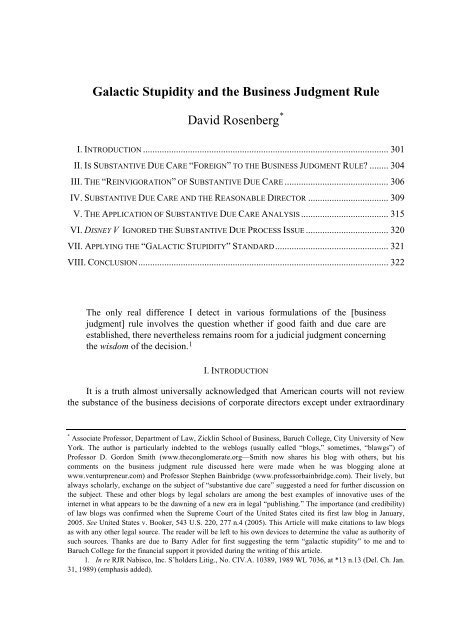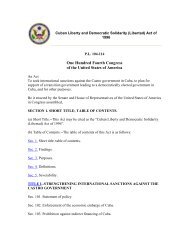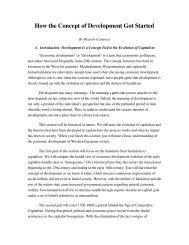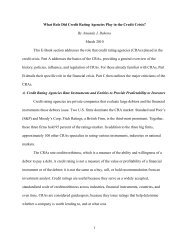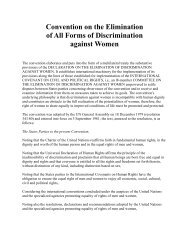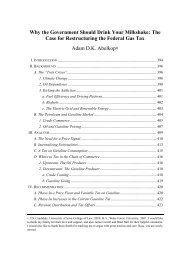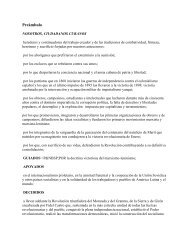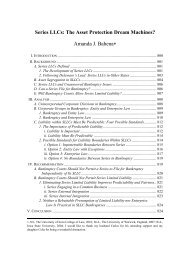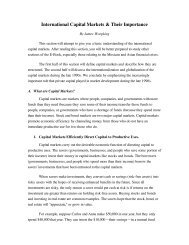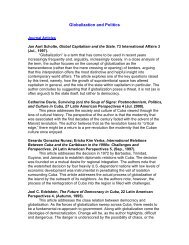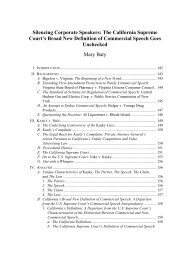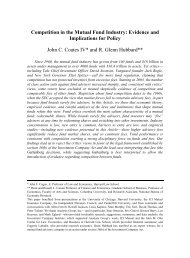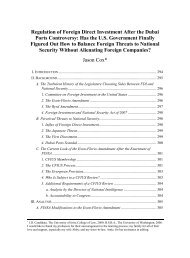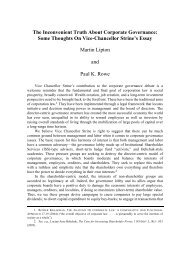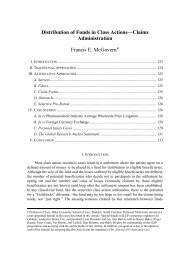Galactic Stupidity and the Business Judgment Rule - College of Law
Galactic Stupidity and the Business Judgment Rule - College of Law
Galactic Stupidity and the Business Judgment Rule - College of Law
You also want an ePaper? Increase the reach of your titles
YUMPU automatically turns print PDFs into web optimized ePapers that Google loves.
<strong>Galactic</strong> <strong>Stupidity</strong> <strong>and</strong> <strong>the</strong> <strong>Business</strong> <strong>Judgment</strong> <strong>Rule</strong><br />
David Rosenberg *<br />
I. INTRODUCTION ........................................................................................................ 301<br />
II. IS SUBSTANTIVE DUE CARE “FOREIGN” TO THE BUSINESS JUDGMENT RULE? ........ 304<br />
III. THE “REINVIGORATION” OF SUBSTANTIVE DUE CARE ............................................ 306<br />
IV. SUBSTANTIVE DUE CARE AND THE REASONABLE DIRECTOR .................................. 309<br />
V. THE APPLICATION OF SUBSTANTIVE DUE CARE ANALYSIS ..................................... 315<br />
VI. DISNEY V IGNORED THE SUBSTANTIVE DUE PROCESS ISSUE ................................... 320<br />
VII. APPLYING THE “GALACTIC STUPIDITY” STANDARD................................................ 321<br />
VIII. CONCLUSION.......................................................................................................... 322<br />
The only real difference I detect in various formulations <strong>of</strong> <strong>the</strong> [business<br />
judgment] rule involves <strong>the</strong> question whe<strong>the</strong>r if good faith <strong>and</strong> due care are<br />
established, <strong>the</strong>re never<strong>the</strong>less remains room for a judicial judgment concerning<br />
<strong>the</strong> wisdom <strong>of</strong> <strong>the</strong> decision. 1<br />
I. INTRODUCTION<br />
It is a truth almost universally acknowledged that American courts will not review<br />
<strong>the</strong> substance <strong>of</strong> <strong>the</strong> business decisions <strong>of</strong> corporate directors except under extraordinary<br />
* Associate Pr<strong>of</strong>essor, Department <strong>of</strong> <strong>Law</strong>, Zicklin School <strong>of</strong> <strong>Business</strong>, Baruch <strong>College</strong>, City University <strong>of</strong> New<br />
York. The author is particularly indebted to <strong>the</strong> weblogs (usually called “blogs,” sometimes, “blawgs”) <strong>of</strong><br />
Pr<strong>of</strong>essor D. Gordon Smith (www.<strong>the</strong>conglomerate.org—Smith now shares his blog with o<strong>the</strong>rs, but his<br />
comments on <strong>the</strong> business judgment rule discussed here were made when he was blogging alone at<br />
www.venturpreneur.com) <strong>and</strong> Pr<strong>of</strong>essor Stephen Bainbridge (www.pr<strong>of</strong>essorbainbridge.com). Their lively, but<br />
always scholarly, exchange on <strong>the</strong> subject <strong>of</strong> “substantive due care” suggested a need for fur<strong>the</strong>r discussion on<br />
<strong>the</strong> subject. These <strong>and</strong> o<strong>the</strong>r blogs by legal scholars are among <strong>the</strong> best examples <strong>of</strong> innovative uses <strong>of</strong> <strong>the</strong><br />
internet in what appears to be <strong>the</strong> dawning <strong>of</strong> a new era in legal “publishing.” The importance (<strong>and</strong> credibility)<br />
<strong>of</strong> law blogs was confirmed when <strong>the</strong> Supreme Court <strong>of</strong> <strong>the</strong> United States cited its first law blog in January,<br />
2005. See United States v. Booker, 543 U.S. 220, 277 n.4 (2005). This Article will make citations to law blogs<br />
as with any o<strong>the</strong>r legal source. The reader will be left to his own devices to determine <strong>the</strong> value as authority <strong>of</strong><br />
such sources. Thanks are due to Barry Adler for first suggesting <strong>the</strong> term “galactic stupidity” to me <strong>and</strong> to<br />
Baruch <strong>College</strong> for <strong>the</strong> financial support it provided during <strong>the</strong> writing <strong>of</strong> this article.<br />
1. In re RJR Nabisco, Inc. S’holders Litig., No. CIV.A. 10389, 1989 WL 7036, at *13 n.13 (Del. Ch. Jan.<br />
31, 1989) (emphasis added).
302 The Journal <strong>of</strong> Corporation <strong>Law</strong> [Winter<br />
circumstances. Embodied in <strong>the</strong> much-debated 2 “business judgment rule,” <strong>the</strong> deference<br />
displayed towards <strong>the</strong> decisions <strong>of</strong> corporate directors arises not from a belief that<br />
directors are always right, or even always honorable, but from a belief that “investors’<br />
wealth would be lower if managers’ decisions were routinely subjected to strict judicial<br />
review.” 3 Corporate directors take <strong>the</strong> kind <strong>of</strong> risks that investors want <strong>the</strong>m to take<br />
because <strong>the</strong> directors know that, whatever <strong>the</strong> outcome, stockholders will not have any<br />
legal recourse for losses arising from those actions unless <strong>the</strong> decision makers violated a<br />
duty such as loyalty or good faith. The belief in this general principle <strong>of</strong> <strong>the</strong> business<br />
judgment rule is so widespread that, despite <strong>the</strong> recent sc<strong>and</strong>als <strong>and</strong> negative publicity<br />
surrounding <strong>the</strong> conduct <strong>of</strong> corporate directors, few participants in <strong>the</strong> debate are calling<br />
for significant changes to <strong>the</strong> rule’s deference to actions taken by corporate decision<br />
makers. 4<br />
There is plainly broad agreement that shareholders make more money when<br />
directors know <strong>the</strong>y can make decisions—especially risky decisions—without <strong>the</strong> fear<br />
that <strong>the</strong>y 5 or <strong>the</strong> company will be <strong>the</strong> subject <strong>of</strong> successful legal actions should those<br />
decisions not ultimately benefit <strong>the</strong> company or <strong>the</strong> shareholders <strong>the</strong>mselves. This does<br />
not mean that <strong>the</strong> legislative, judicial, legal, financial, academic, <strong>and</strong> investor<br />
communities do not view with disdain directors who make bad decisions, foolish<br />
decisions, or excessively risky decisions. It simply means that <strong>the</strong>se communities do not<br />
wish to impose legal liability on directors, or <strong>the</strong> corporations <strong>the</strong>y oversee, for <strong>the</strong><br />
negative consequences <strong>of</strong> such decisions. 6 A board <strong>of</strong> directors that pig-headedly leads a<br />
2. Indeed, <strong>the</strong> very term “business judgment rule” has come under criticism. One commentator, for<br />
example, insists that it is not a rule, but a st<strong>and</strong>ard with no bright-line separating acceptable from prohibited<br />
conduct. Stephen M. Bainbridge, The <strong>Business</strong> <strong>Judgment</strong> <strong>Rule</strong> as Abstention Doctrine, 57 VAND. L. REV. 83,<br />
128 (2004).<br />
3. FRANK H. EASTERBROOK & DANIEL R. FISCHEL, THE ECONOMIC STRUCTURE OF CORPORATE LAW 93<br />
(1991); see also In Re Caremark Int’l Inc. Derivative Litig., 698 A.2d 959, 967 (Del. Ch. 1996) (“To employ a<br />
different rule—one that permitted an ‘objective’ evaluation <strong>of</strong> <strong>the</strong> decision—would expose directors to<br />
substantive second guessing by ill-equipped judges or juries, which would, in <strong>the</strong> long-run be injurious to<br />
investor interests.”); E. Norman Veasey & Christine T. Di Guglielmo, What Happened in Delaware Corporate<br />
<strong>Law</strong> <strong>and</strong> Governance from 1992-2004? A Retrospective on Some Key Developments, 153 U. PA. L. REV. 1399,<br />
1413 (2005) (Retired Chief Justice <strong>of</strong> <strong>the</strong> Delaware Supreme Court <strong>and</strong> co-author note that “[g]ood governance<br />
practices permit <strong>the</strong> time-honored business judgment rule regime to operate with integrity by checking selfinterest<br />
<strong>and</strong> sloth while permitting valuable <strong>and</strong> prudent risk taking.”).<br />
4. One recent exception is Jeremy Telman, The <strong>Business</strong> <strong>Judgment</strong> <strong>Rule</strong>, Disclosure <strong>and</strong> Executive<br />
Compensation, 81 TUL. L. REV. (forthcoming March 2006), available at http://ssrn.com/abstract=895548<br />
(arguing that <strong>the</strong> rule should not apply except where review <strong>of</strong> a business decision would entail disclosure <strong>of</strong><br />
information that would result in harm to <strong>the</strong> corporation). The rule is no longer needed to protect directors, he<br />
says, because directors are already protected through o<strong>the</strong>r means, such as Delaware’s 102(b)(7).<br />
5. This Article does not focus on <strong>the</strong> issue <strong>of</strong> <strong>the</strong> personal liability <strong>of</strong> corporate directors, but ra<strong>the</strong>r on<br />
<strong>the</strong> ability <strong>of</strong> shareholders to bring any kind <strong>of</strong> successful legal action (for example, an injunction) against <strong>the</strong>m<br />
or against <strong>the</strong> company itself for decisions made by <strong>the</strong> directors on <strong>the</strong> company’s behalf. While section<br />
102(b)(7) <strong>of</strong> Delaware’s corporate code permits exculpation <strong>of</strong> directors for certain breaches <strong>of</strong> fiduciary duty,<br />
that is a separate issue from <strong>the</strong> question <strong>of</strong> <strong>the</strong> breadth <strong>of</strong> <strong>the</strong> business judgment rule’s protection. For a recent<br />
discussion <strong>of</strong> <strong>the</strong> exculpation issue, see David Rosenberg, Making Sense <strong>of</strong> Good Faith in Delaware Corporate<br />
Fiduciary <strong>Law</strong>, 29 DEL. J. CORP. L. 491 (2004).<br />
6. Of course, <strong>the</strong> marketplace provides effective extra-legal remedies <strong>and</strong> incentives that work to<br />
promote good conduct by directors. See Edward B. Rock & Michael L. Wachter, Isl<strong>and</strong>s <strong>of</strong> Conscious Power:<br />
<strong>Law</strong>, Norms, <strong>and</strong> <strong>the</strong> Self-Governing Corporation, 149 U. PA. L. REV. 1619, 1672 (2001).
2007] <strong>Galactic</strong> <strong>Stupidity</strong> 303<br />
corporation in <strong>the</strong> wrong direction is worthy <strong>of</strong> our contempt <strong>and</strong> deserves to be voted out<br />
or ab<strong>and</strong>oned by investors. But our corporate law does not allow <strong>the</strong> aggrieved to seek<br />
legal action against a corporation just because its directors made a bad decision. As such,<br />
<strong>the</strong> business judgment rule does not seem to have a moral or ethical dimension. Ra<strong>the</strong>r, it<br />
is one <strong>of</strong> our most utilitarian rules. Wealth is maximized when corporations are run by<br />
directors who know that <strong>the</strong>ir decisions will be reviewed by investors, by analysts, by<br />
stockholders, <strong>and</strong> by business partners—but not by <strong>the</strong> courts. 7<br />
Practically speaking, <strong>the</strong> business judgment rule is “simply a policy <strong>of</strong> judicial nonreview.”<br />
8 It is—except when it allows review. The problem is, as a noted scholar has put<br />
it, “to identify <strong>the</strong> circumstances in which review is necessary.” 9 While many academics<br />
<strong>and</strong> judges repeatedly assert that <strong>the</strong> business judgment rule does not allow for review <strong>of</strong><br />
<strong>the</strong> substance <strong>of</strong> director decision making, Delaware courts none<strong>the</strong>less display an<br />
apparent willingness to do just that when <strong>the</strong> directors’ actions approach <strong>the</strong> borderline <strong>of</strong><br />
good faith. 10 Indeed, in cases in which <strong>the</strong> plaintiffs allege bad faith but <strong>the</strong> facts do not<br />
present evidence <strong>of</strong> disloyalty or a knowing breach <strong>of</strong> duty, courts review <strong>the</strong> substance<br />
<strong>of</strong> <strong>the</strong> directors’ decision in order to determine whe<strong>the</strong>r or not <strong>the</strong> directors have<br />
complied with all <strong>of</strong> <strong>the</strong>ir fiduciary obligations <strong>and</strong> <strong>the</strong>refore, whe<strong>the</strong>r <strong>the</strong> plaintiffs have<br />
7. In <strong>the</strong> Delaware Court <strong>of</strong> Chancery’s August 2005 decision in <strong>the</strong> much-litigated case involving<br />
Disney’s hiring <strong>and</strong> firing <strong>of</strong> Michael Ovitz, Chancellor Ch<strong>and</strong>ler began with an almost-sentimental affirmation<br />
<strong>of</strong> <strong>the</strong> importance <strong>of</strong> allowing directors discretion to create wealth through <strong>the</strong>ir own decision making:<br />
The redress for failures that arise from faithful management must come from <strong>the</strong> markets, through<br />
<strong>the</strong> action <strong>of</strong> shareholders <strong>and</strong> <strong>the</strong> free flow <strong>of</strong> capital, <strong>and</strong> not from this Court. Should <strong>the</strong> Court<br />
apportion liability based on <strong>the</strong> ultimate outcome <strong>of</strong> decisions taken in good faith by faithful<br />
directors or <strong>of</strong>ficers, those decision-makers would necessarily take decisions that minimize risk,<br />
not maximize value. The entire advantage <strong>of</strong> <strong>the</strong> risk-taking, innovative, wealth-creating engine<br />
that is <strong>the</strong> Delaware corporation would cease to exist, with disastrous results for shareholders <strong>and</strong><br />
society alike.<br />
In re The Walt Disney Co. Derivative Litig. (Disney IV), No. CIV.A. 15452, 2005 WL 2056651, at *2 (Del. Ch.<br />
Aug. 9, 2005). In its decision, <strong>the</strong> Court appeared to adopt a shorth<strong>and</strong> system for referring to <strong>the</strong> many<br />
decisions in <strong>the</strong> dispute. This Article will follow <strong>the</strong> Court’s lead. The Delaware Supreme Court affirmed <strong>the</strong><br />
Court <strong>of</strong> Chancery’s Disney IV decision in June 2006. In re The Walt Disney Co. Derivative Litig. (Disney V),<br />
906 A.2d 27 (Del. 2006). The reader will notice <strong>the</strong> conspicuous absence <strong>of</strong> In re The Walt Disney Co.<br />
Derivative Litigation (Disney III), No. Civ. A. 15452, 2004 WL 2050138 (Del. Ch. Sept. 10, 2004) from this<br />
discussion. That ruling is not terribly relevant here because it largely concerned <strong>the</strong> issue <strong>of</strong> whe<strong>the</strong>r or not<br />
Michael Ovitz owed a fiduciary duty to Disney at <strong>the</strong> time he was negotiating his employment package. Disney<br />
III did not focus on whe<strong>the</strong>r <strong>the</strong> decisions <strong>of</strong> <strong>the</strong> various directors should receive <strong>the</strong> protection <strong>of</strong> <strong>the</strong> business<br />
judgment rule for <strong>the</strong>ir decision to approve Ovitz’s compensation package.<br />
8. Lyman Johnson, The Modest <strong>Business</strong> <strong>Judgment</strong> <strong>Rule</strong>, 55 BUS. LAW. 625, 631 (2000). A more purist<br />
view <strong>of</strong> <strong>the</strong> business judgment rule is exemplified by <strong>the</strong> work <strong>of</strong> Stephen Bainbridge, whose conception <strong>of</strong> <strong>the</strong><br />
corporation requires an almost-reflexive refusal by courts to review director decision making. See Bainbridge,<br />
supra note 2. Bainbridge argues that, whatever <strong>the</strong> st<strong>and</strong>ard is that allows review, courts should approach<br />
allegations <strong>of</strong> director misconduct with <strong>the</strong> presumption that <strong>the</strong>y will abstain from reviewing <strong>the</strong> directors’<br />
actions. Such an approach, he says, makes review “<strong>the</strong> exception ra<strong>the</strong>r than <strong>the</strong> rule.” Id. at 128. This Article<br />
attempts to determine when Delaware courts will make that exception.<br />
9. Bainbridge, supra note 2, at 127.<br />
10. This Article focuses exclusively on Delaware law because it is considered <strong>the</strong> default source for<br />
American corporate law <strong>and</strong> because <strong>the</strong> debate over substantive due care has begun to play out in its courts.<br />
While not <strong>the</strong> subject <strong>of</strong> this Article, a comparison <strong>of</strong> Delaware’s approach to that <strong>of</strong> o<strong>the</strong>r states is a subject<br />
ripe for research.
304 The Journal <strong>of</strong> Corporation <strong>Law</strong> [Winter<br />
successfully rebutted <strong>the</strong> presumptions <strong>of</strong> <strong>the</strong> business judgment rule.<br />
Although few courts or commentators are willing to use <strong>the</strong> term, substantive due<br />
care analysis is in fact alive in Delaware fiduciary law, <strong>and</strong> has been for at least two<br />
decades. Whe<strong>the</strong>r <strong>the</strong>y call it irrationality, inexplicable behavior, egregious decision<br />
making, gross abuse <strong>of</strong> discretion, inadequacy, action that is beyond <strong>the</strong> realm <strong>of</strong> human<br />
comprehension, sustained inattention, disloyalty, or bad faith, judges <strong>and</strong> commentators<br />
from all sides <strong>of</strong> <strong>the</strong> debate must recognize that sometimes courts cannot avoid reviewing<br />
<strong>the</strong> substantive merits <strong>of</strong> director’s actions. Exemplified by <strong>the</strong> Court <strong>of</strong> Chancery’s 2005<br />
decision in <strong>the</strong> Disney litigation, Delaware courts express an unwillingness to engage in<br />
substantive review, do it anyway, but almost inevitably find in favor <strong>of</strong> <strong>the</strong> defendants.<br />
II. IS SUBSTANTIVE DUE CARE “FOREIGN” TO THE BUSINESS JUDGMENT RULE?<br />
Courts have a relatively easy time reviewing allegations <strong>of</strong> disloyalty or self-dealing<br />
by corporate directors. Virtually every formulation <strong>of</strong> <strong>the</strong> business judgment rule<br />
precludes protection <strong>of</strong> directors who do not act in <strong>the</strong> best interests <strong>of</strong> <strong>the</strong> company but<br />
ra<strong>the</strong>r for <strong>the</strong>ir own benefit. 11 Rebutting <strong>the</strong> presumption <strong>of</strong> director loyalty is a fairly<br />
straightforward matter for <strong>the</strong> plaintiff. He must simply show that <strong>the</strong> director herself<br />
benefited from <strong>the</strong> decision, <strong>and</strong> that <strong>the</strong> decision was not fair. 12 The rule <strong>the</strong>refore<br />
allows aggrieved shareholders to recover when a director made a decision that was<br />
tainted by self-interest <strong>and</strong> that was not a good deal for <strong>the</strong> company. To allow a court to<br />
review a disloyal decision <strong>and</strong> even to impose liability on a company for a disloyal <strong>and</strong><br />
unfair decision does not threaten <strong>the</strong> freedom <strong>of</strong> directors to act with discretion because,<br />
in such a situation, one might say that <strong>the</strong> director did not exercise discretion at all.<br />
Ra<strong>the</strong>r, <strong>the</strong> director acted in direct contradiction to her obligation to make decisions on<br />
behalf <strong>of</strong> <strong>the</strong> well-being <strong>of</strong> <strong>the</strong> corporation <strong>and</strong> its shareholders.<br />
The appropriateness <strong>of</strong> judicial review becomes trickier, however, when <strong>the</strong> plaintiff<br />
alleges not that <strong>the</strong> director breached his duty <strong>of</strong> loyalty, but ra<strong>the</strong>r that <strong>the</strong> director<br />
breached some o<strong>the</strong>r duty (we will attempt to define it) that did not apparently involve<br />
self-interest. A director breaches no duty simply by making a decision that does not turn<br />
out to benefit <strong>the</strong> corporation, even if it was obvious to most observers at <strong>the</strong> time that it<br />
was a bad decision. It is well settled that <strong>the</strong> business judgment rule will not allow review<br />
<strong>of</strong> director decisions that, in retrospect, are “pretty dumb,” 13 “substantively wrong, or<br />
degrees <strong>of</strong> wrong extending through ‘stupid’ to ‘egregious’ or ‘irrational,’” 14 as long as<br />
<strong>the</strong> process used was rational or <strong>the</strong> decision made in good faith. Delaware courts will<br />
not, as Chancellor Ch<strong>and</strong>ler wrote in Disney IV, “hold fiduciaries liable for a failure to<br />
comply with <strong>the</strong> aspirational ideal <strong>of</strong> best practices.” 15 That is to say, Delaware courts<br />
will not review <strong>the</strong> substantive wisdom <strong>of</strong> decisions made by corporate directors; put<br />
11. Aronson v. Lewis, 473 A.2d 805, 812 (Del. 1984). This justifiably much-maligned decision also held<br />
that courts will presume directors acted “on an informed basis” <strong>and</strong> in “good faith.” Id. What <strong>the</strong>se terms mean<br />
is plainly open to question. Its holding regarding loyalty, however, is less controversial.<br />
12. Id.<br />
13. Rock & Wachter, supra note 6, at 1672.<br />
14. In re Caremark Int’l Inc. Derivative Litig., 698 A.2d 959, 967 (Del. Ch. 1996).<br />
15. In re The Walt Disney Co. Derivative Litig. (Disney IV), No. CIV.A. 15452, 2005 WL 2056651, at *1<br />
(Del. Ch. Aug. 9, 2005).
2007] <strong>Galactic</strong> <strong>Stupidity</strong> 305<br />
ano<strong>the</strong>r way, courts will not engage in substantive due care analysis.<br />
Although <strong>the</strong> phrase “substantive due care” had been used in various jurisdictions<br />
over <strong>the</strong> years, it became code for that-which-is-not-reviewable in <strong>the</strong> wake <strong>of</strong> <strong>the</strong><br />
Delaware Supreme Court’s 2000 decision in Brehm v. Eisner, 16 <strong>the</strong> first pivotal decision<br />
in <strong>the</strong> Disney litigation. In that decision, <strong>the</strong> court reviewed a lower court ruling<br />
dismissing a shareholder derivative suit against <strong>the</strong> Walt Disney Company for approving<br />
an extremely generous employment contract for executive Michael Ovitz. 17 The deal<br />
allowed Ovitz to leave <strong>the</strong> company fourteen months after his hire with a severance<br />
package worth $140 million. 18<br />
That Disney’s shareholders wanted a court to review <strong>the</strong> directors’ conduct in<br />
approving such a payout is not surprising. Nor is it surprising that <strong>the</strong> Delaware Supreme<br />
Court failed to embrace that prospect with much enthusiasm. 19 The court took particular<br />
pains to address <strong>the</strong> plaintiffs’ allegation that <strong>the</strong> directors failed to exercise “substantive<br />
due care.” In a now much-quoted passage, 20 <strong>the</strong> court attempted to dispose <strong>of</strong> <strong>the</strong> idea <strong>of</strong><br />
substantive due care review in Delaware law:<br />
As for <strong>the</strong> plaintiffs’ contention that <strong>the</strong> directors failed to exercise “substantive<br />
due care,” we should note that such a concept is foreign to <strong>the</strong> business<br />
judgment rule. Courts do not measure, weigh or quantify directors’ judgments.<br />
We do not even decide if <strong>the</strong>y are reasonable in this context. Due care in <strong>the</strong><br />
decision making context is process due care only. Irrationality is <strong>the</strong> outer limit<br />
<strong>of</strong> <strong>the</strong> business judgment rule. Irrationality may be <strong>the</strong> functional equivalent <strong>of</strong><br />
<strong>the</strong> waste test or it may tend to show that <strong>the</strong> decision is not made in good faith,<br />
which is a key ingredient <strong>of</strong> <strong>the</strong> business judgment rule. 21<br />
None<strong>the</strong>less, <strong>the</strong> court allowed <strong>the</strong> plaintiffs to amend <strong>the</strong>ir complaint so that it would<br />
allege more specific facts that might present doubt that <strong>the</strong> decision <strong>of</strong> <strong>the</strong> directors to<br />
approve Ovitz’s employment package was protected by <strong>the</strong> business judgment rule. 22<br />
The language quoted above ought to have put to rest <strong>the</strong> idea that courts might be<br />
willing to review director decisions based on <strong>the</strong> substantive wisdom <strong>of</strong> <strong>the</strong> decision<br />
16. Brehm v. Eisner, 746 A.2d 244 (Del. 2000).<br />
17. Id. at 248.<br />
18. Id. at 250-51.<br />
19. Id. at 266 (noting that it runs “counter to <strong>the</strong> foundation <strong>of</strong> our jurisprudence” for courts to “become<br />
super-directors, measuring matters <strong>of</strong> degree in business decision-making”).<br />
20. A few years after <strong>the</strong> decision, one commentator said that <strong>the</strong> decision actually served as a<br />
“reinvigoration <strong>of</strong> substantive due care” by putting a greater emphasis on <strong>the</strong> duty <strong>of</strong> good faith which might<br />
ultimately lead to examination <strong>of</strong> <strong>the</strong> substance <strong>of</strong> a director’s decision. D. Gordon Smith, The Fiduciary Duty<br />
<strong>of</strong> Good Faith, The Conglomerate, http://www.<strong>the</strong>conglomerate.org/2003/11/<strong>the</strong>_fiduciary_d.html (Nov. 26,<br />
2003) [hereinafter Smith blog, The Fiduciary Duty <strong>of</strong> Good Faith]. Smith has since changed his mind <strong>and</strong> more<br />
recently described <strong>the</strong> case as “a modern version <strong>of</strong> Van Gorkom.” D. Gordon Smith, The Good Faith<br />
Thaumatrope, The Conglomerate, http://www.<strong>the</strong>conglomerate.org/2005/01/em<strong>the</strong>_good_fait.html (Jan. 9,<br />
2005). I point out that Smith changed his mind not to suggest that he is fickle, but ra<strong>the</strong>r to illustrate <strong>the</strong> fluidity<br />
<strong>of</strong> <strong>the</strong> debate on substantive due care. Smith’s changed thinking perhaps also illustrates <strong>the</strong> dangers <strong>of</strong> using law<br />
blogs as scholarly sources (something that I—not Smith—am doing) since <strong>the</strong>y are intended to, among o<strong>the</strong>r<br />
things, allow <strong>the</strong>ir authors to air ideas without committing those ideas to <strong>the</strong> permanence <strong>of</strong> traditional<br />
publications.<br />
21. Brehm, 746 A.2d at 264.<br />
22. Id. at 266.
306 The Journal <strong>of</strong> Corporation <strong>Law</strong> [Winter<br />
itself. Indeed, <strong>the</strong> author <strong>of</strong> <strong>the</strong> opinion, former Chief Justice Veasey has taken to quoting<br />
its language as an unambiguous affirmation <strong>of</strong> a rule that requires little interpretation. 23<br />
Far from it. In fact, that ruling led <strong>the</strong> Court <strong>of</strong> Chancery to reassert <strong>the</strong> possibility <strong>of</strong><br />
reviewing director decisions on <strong>the</strong> substantive merits by simply calling it by ano<strong>the</strong>r<br />
name. 24<br />
III. THE “REINVIGORATION” 25 OF SUBSTANTIVE DUE CARE<br />
In 2003, <strong>the</strong> Court <strong>of</strong> Chancery finally got a chance to hear <strong>the</strong> plaintiffs’ amended<br />
complaint in <strong>the</strong> Disney litigation. 26 In refusing to dismiss <strong>the</strong> complaint, <strong>the</strong> court took a<br />
hard look at <strong>the</strong> actions (<strong>and</strong> inactions) <strong>of</strong> <strong>the</strong> company’s directors when <strong>the</strong>y approved<br />
Ovitz’s seemingly preposterous no-fault termination agreement. More or less ignoring <strong>the</strong><br />
language used by <strong>the</strong> Supreme Court in Brehm, <strong>the</strong> Court <strong>of</strong> Chancery focused on <strong>the</strong><br />
state <strong>of</strong> mind <strong>of</strong> <strong>the</strong> directors, ultimately framing <strong>the</strong> issue around <strong>the</strong> question <strong>of</strong> good<br />
faith. 27 The court said that <strong>the</strong> complaint depicted <strong>the</strong> directors’ actions as failures going<br />
beyond mere negligence or even gross negligence because <strong>the</strong> plaintiffs had claimed that<br />
“<strong>the</strong> defendant directors consciously <strong>and</strong> intentionally disregarded <strong>the</strong>ir responsibilities,<br />
adopting a ‘we don’t care about <strong>the</strong> risks’ attitude concerning a material corporate<br />
decision.” 28 The court placed heavy emphasis on <strong>the</strong> allegation that <strong>the</strong> directors knew<br />
that <strong>the</strong>y were making a decision without adequate information <strong>and</strong> that <strong>the</strong>y “simply did<br />
not care if <strong>the</strong> decisions caused <strong>the</strong> corporation <strong>and</strong> its stockholders to suffer injury or<br />
loss.” 29 If such allegations are true, <strong>the</strong> court said, defendants might have breached <strong>the</strong>ir<br />
obligation “to act honestly <strong>and</strong> in good faith in <strong>the</strong> corporation’s best interests” <strong>and</strong> <strong>the</strong>ir<br />
conduct <strong>the</strong>refore could well have fallen outside <strong>the</strong> protection <strong>of</strong> <strong>the</strong> business judgment<br />
rule. 30<br />
This decision made news not only because it concerned two high pr<strong>of</strong>ile executives<br />
at a world famous company. It made news—among legal academics at least—because <strong>of</strong><br />
<strong>the</strong> court’s apparent new enthusiasm for <strong>the</strong> duty <strong>of</strong> good faith. But <strong>the</strong> response to <strong>the</strong><br />
23. E. Norman Veasey, Juxtaposing Best Practices <strong>and</strong> Delaware Corporate Jurisprudence, 18 INSIGHTS<br />
5 (2004). It is worth pointing out though that, in Brehm, he said <strong>the</strong> business judgment rule had been “well<br />
formulated by Aronson . . .,” Brehm, 746 A.2d at 264 n.64, although that formulation has been almost<br />
universally condemned. See, e.g., Johnson, supra note 8, at 626.<br />
24. See Smith blog, The Fiduciary Duty <strong>of</strong> Good Faith, supra note 20 (explaining that <strong>the</strong> chancery court<br />
essentially applied substantive due care but referred to it as a duty <strong>of</strong> good faith).<br />
25. Id.<br />
26. In re The Walt Disney Co. Derivative Litig. (Disney II), 825 A.2d 275 (Del. Ch. 2003).<br />
27. This was not <strong>the</strong> first time <strong>the</strong> chancery court boldly departed from <strong>the</strong> guidance <strong>of</strong>fered by <strong>the</strong> state’s<br />
highest court regarding <strong>the</strong> fiduciary duties <strong>of</strong> corporate directors. In determining <strong>the</strong> meaning <strong>of</strong> <strong>the</strong> term<br />
“good faith” as it appears in Section 102(b)(7), <strong>the</strong> law that allows corporations to waive <strong>the</strong> liability <strong>of</strong><br />
directors for certain breaches <strong>of</strong> fiduciary duty, <strong>the</strong> chancery court has criticized <strong>the</strong> supreme court’s language<br />
<strong>and</strong> formulated its own definition <strong>of</strong> that crucial term. See Rosenberg, supra note 5.<br />
28. Disney II, 825 A.2d at 289 (emphasis in original). The court said that <strong>the</strong> complaint charged <strong>the</strong> board<br />
<strong>of</strong> directors with taking an “ostrich-like approach regarding Ovitz’s non-fault termination.” Id. at 288. It is a<br />
nice metaphor (presumably alluding to <strong>the</strong> popular belief that an ostrich sticks its head in <strong>the</strong> s<strong>and</strong> when it<br />
encounters trouble) because it plainly indicates that <strong>the</strong> board did not merely fail to consider what it might have<br />
seen, but ra<strong>the</strong>r it deliberately failed to see.<br />
29. Id. at 289.<br />
30. Id.
2007] <strong>Galactic</strong> <strong>Stupidity</strong> 307<br />
decision led to widely divergent conclusions. At least one commentator, Hillary Sale,<br />
embraced <strong>the</strong> decision as an indication <strong>of</strong> <strong>the</strong> emergence <strong>of</strong> a “third, <strong>and</strong> separate, duty:<br />
that <strong>of</strong> good faith,” distinct from <strong>the</strong> o<strong>the</strong>r two fiduciary duties <strong>of</strong> care <strong>and</strong> loyalty. 31 She<br />
argued that since <strong>the</strong> court was not willing to categorize <strong>the</strong> alleged misconduct as purely<br />
a breach <strong>of</strong> <strong>the</strong> duty <strong>of</strong> care (<strong>and</strong> thus allow exculpation under 102(b)(7)), it could only be<br />
a question <strong>of</strong> good faith. 32 She concluded that “conscious disregard <strong>of</strong> one’s duties to <strong>the</strong><br />
company presents a good faith issue, not simply a procedural lapse <strong>of</strong> due care.” 33 A key<br />
element, <strong>the</strong>n, <strong>of</strong> Sale’s vision <strong>of</strong> <strong>the</strong> duty <strong>of</strong> good faith is <strong>the</strong> state <strong>of</strong> mind <strong>of</strong> <strong>the</strong><br />
director. In order for a director to violate <strong>the</strong> duty <strong>of</strong> good faith, he must have been aware<br />
that he was failing to do what he was obligated to do. Sale, however, does not make clear<br />
what kind <strong>of</strong> behavior might constitute a breach <strong>of</strong> <strong>the</strong> duty <strong>of</strong> good faith but not a breach<br />
<strong>of</strong> <strong>the</strong> duties <strong>of</strong> loyalty or care. 34<br />
O<strong>the</strong>r commentators were more hesitant to view good faith as described in Disney II<br />
as a separate duty. The author <strong>of</strong> <strong>the</strong> present Article, for example, took essentially <strong>the</strong><br />
opposite view. He argued that <strong>the</strong> decision in Disney II fit into a string <strong>of</strong> cases by <strong>the</strong><br />
Court <strong>of</strong> Chancery that increasingly treat good faith not as a separate duty but ra<strong>the</strong>r as a<br />
term that encompasses all <strong>of</strong> <strong>the</strong> obligations <strong>of</strong> corporate <strong>of</strong>ficers in <strong>the</strong> same way that<br />
parties to a contract have a duty <strong>of</strong> good faith. 35 That is to say, <strong>the</strong> duty <strong>of</strong> good faith<br />
requires corporate directors to make an honest effort to adhere to <strong>the</strong> duties <strong>of</strong> care <strong>and</strong><br />
loyalty. A knowing breach <strong>of</strong> <strong>the</strong> duties <strong>of</strong> care or loyalty (or indeed any o<strong>the</strong>r duty) is a<br />
breach <strong>of</strong> <strong>the</strong> duty <strong>of</strong> good faith. 36 Good faith, however, does not exist as a duty that can<br />
be defined on its own terms without reference to o<strong>the</strong>r duties.<br />
In an article that turned out to have a great deal <strong>of</strong> influence on Chancellor<br />
Ch<strong>and</strong>ler’s later decision in Disney IV, Sean Griffith also rejected <strong>the</strong> idea that a separate<br />
duty <strong>of</strong> good faith had emerged from Disney II. Ra<strong>the</strong>r, he described good faith in Disney<br />
II as a duty that alternates between loyalty <strong>and</strong> care, without actually encompassing<br />
ei<strong>the</strong>r. 37 In that decision, Griffith says, good faith covered ground that was not defined<br />
31. Hillary A. Sale, Delaware’s Good Faith, 89 CORNELL L. REV. 456, 482 (2004).<br />
32. Id.<br />
33. Id. Sale is perhaps suggesting here that since a breach <strong>of</strong> good faith is not a “procedural lapse <strong>of</strong> due<br />
care,” it must <strong>the</strong>refore be a substantive breach, although she does not use <strong>the</strong> phrase “substantive due care.”<br />
34. For my earlier discussion <strong>of</strong> Sale’s article, see Rosenberg, supra note 5, at 508-09.<br />
35. Id. My approach in that piece arose from an ideological view (contractarianism) embraced by many<br />
lawyers <strong>and</strong> academics, that corporations, like o<strong>the</strong>r business entities or indeed o<strong>the</strong>r business agreements,<br />
should be viewed as simply conglomerations <strong>of</strong> contractual promises that require adherence to certain duties by<br />
<strong>the</strong> various parties. Id. at 493-94. While that piece suggested that Delaware courts ought to approach corporate<br />
fiduciary duties from a contractarian perspective, <strong>the</strong> accuracy <strong>of</strong> my assessment <strong>of</strong> <strong>the</strong> bounds <strong>of</strong> good faith<br />
under Delaware law does not necessarily require adherence to <strong>the</strong> contractarian view by <strong>the</strong> courts.<br />
36. In this Article, I will argue that <strong>the</strong> duty <strong>of</strong> good faith is in fact more expansive. Delaware courts<br />
appear willing to find that a director acted in bad faith simply because his decision was egregious, even if <strong>the</strong><br />
director did not know that he was making an egregiously bad decision.<br />
37. Sean J. Griffith, Good Faith <strong>Business</strong> <strong>Judgment</strong>: A Theory <strong>of</strong> Rhetoric in Corporate <strong>Law</strong><br />
Jurisprudence, 55 DUKE L.J. 1, 21-23 (2005). In his Article, Griffith employs one <strong>of</strong> <strong>the</strong> all-time great legal<br />
metaphors. He says that <strong>the</strong> duty <strong>of</strong> good faith alternates between <strong>the</strong> duty <strong>of</strong> care <strong>and</strong> <strong>the</strong> duty <strong>of</strong> loyalty like<br />
<strong>the</strong> image <strong>of</strong> a caged bird in a thaumatrope. He explains:<br />
[a thaumatrope is] an optical toy involving a disc with a different image on each side—a horse <strong>and</strong><br />
a man, for example, or a bird <strong>and</strong> a cage—<strong>and</strong> a string attached at ei<strong>the</strong>r edge <strong>of</strong> <strong>the</strong> disc enabling<br />
<strong>the</strong> device to spin. When <strong>the</strong> viewer spins <strong>the</strong> thaumatrope, <strong>the</strong> images on ei<strong>the</strong>r side <strong>of</strong> <strong>the</strong> disc
308 The Journal <strong>of</strong> Corporation <strong>Law</strong> [Winter<br />
precisely by care or loyalty because <strong>the</strong> claim in that case could not have survived a<br />
motion to dismiss on ei<strong>the</strong>r <strong>of</strong> those traditional fiduciary duties. 38 So if a court relies on<br />
good faith to allow a case alleging director misconduct to go forward, what is <strong>the</strong> content<br />
<strong>of</strong> that duty? Griffith believes that good faith ultimately boils down to one question: “Are<br />
<strong>the</strong> directors doing <strong>the</strong>ir best in acting for someone else?” 39 When framed this way, that<br />
duty could indeed include conduct that violates ei<strong>the</strong>r <strong>the</strong> duty <strong>of</strong> loyalty or <strong>the</strong> duty <strong>of</strong><br />
care as well as perhaps o<strong>the</strong>r conduct. 40<br />
Lyman Johnson views Disney II’s definition <strong>of</strong> good faith as prohibiting behavior<br />
where <strong>the</strong> director consciously knows he is disregarding <strong>the</strong> duties <strong>of</strong> care or loyalty. 41<br />
To Johnson, good faith is all about motive. Focusing on <strong>the</strong> allegations that <strong>the</strong> Disney<br />
directors acted with “deliberate indifference” <strong>and</strong> adopted a “‘we don’t care about <strong>the</strong><br />
risks’ attitude,” Johnson asserts that <strong>the</strong> court in Disney II made inferences about <strong>the</strong><br />
directors’ motives by evaluating <strong>the</strong>ir conduct. 42 Bad faith (that is, conduct that is not<br />
properly motivated) can be construed from <strong>the</strong> nature <strong>of</strong> <strong>the</strong> conduct itself. Johnson<br />
presciently explains that, “this allows <strong>the</strong> court an indirect way to do what <strong>the</strong> business<br />
judgment rule precludes—consider <strong>the</strong> substance <strong>of</strong> director conduct; not to assess it<br />
outright, but to draw an inference <strong>of</strong> bad motive if it is sufficiently egregious.” 43<br />
Ano<strong>the</strong>r scholar, Stephen Bainbridge, addressed <strong>the</strong> implications <strong>of</strong> <strong>the</strong> Disney II<br />
decision on his blog. Bainbridge is an ardent proponent <strong>of</strong> <strong>the</strong> “director primacy” view <strong>of</strong><br />
<strong>the</strong> corporation which regards directors as <strong>the</strong> ultimate powerbrokers in publicly held<br />
corporations. 44 Such a view prefers that <strong>the</strong> business judgment rule be understood as a<br />
doctrine <strong>of</strong> abstention, “pursuant to which courts in fact refrain from reviewing board<br />
decisions unless exacting preconditions for review are satisfied.” 45 On his blog,<br />
Bainbridge attempted to reconcile <strong>the</strong> Disney II decision with existing law by <strong>of</strong>fering<br />
two competing interpretations <strong>of</strong> <strong>the</strong> court’s decision that allowed judicial review <strong>of</strong> <strong>the</strong><br />
seem to blend toge<strong>the</strong>r to produce a third image that is a composite <strong>of</strong> <strong>the</strong> o<strong>the</strong>r two—<strong>the</strong> man<br />
atop <strong>the</strong> horse or <strong>the</strong> bird in <strong>the</strong> cage. Good faith, I argue, is simply <strong>the</strong> application <strong>of</strong> <strong>the</strong><br />
thaumatrope to <strong>the</strong> duties <strong>of</strong> care <strong>and</strong> loyalty.<br />
Id. at 6-7.<br />
38. Id. at 20.<br />
39. Id. at 43. As we will see, <strong>the</strong> court in Disney IV did indeed follow Griffith’s dictum by hinting that bad<br />
faith might arise from indifference, although <strong>the</strong> directors might not be aware that <strong>the</strong>y are acting with<br />
indifference.<br />
40. It is <strong>the</strong>refore not all that different from this author’s view in Rosenberg, supra note 5. Both Griffith<br />
<strong>and</strong> I hold open <strong>the</strong> possibility that a director can act in bad faith in a way that does not necessarily breach ei<strong>the</strong>r<br />
<strong>the</strong> duty <strong>of</strong> loyalty or care.<br />
41. Lyman Johnson, The Sarbanes-Oxley Act <strong>and</strong> Fiduciary Duties, 30 WM. MITCHELL L. REV. 1149,<br />
1202-03 (2004). On his blog, D. Gordon Smith expressed a similar view: that good faith review <strong>and</strong> substantive<br />
review are essentially <strong>the</strong> same thing <strong>and</strong> that <strong>the</strong> rise <strong>of</strong> good faith might be leading to greater substantive<br />
review in <strong>the</strong> future. Smith blog, The Fiduciary Duty <strong>of</strong> Good Faith, supra note 20.<br />
42. Johnson supra note 41, at 1202-03.<br />
43. Id. at 1203. This seems to come closest to a prediction <strong>of</strong> what <strong>the</strong> Court <strong>of</strong> Chancery would later do in<br />
Disney IV.<br />
44. See, e.g., Stephen M. Bainbridge, Director Primacy: The Means <strong>and</strong> Ends <strong>of</strong> Corporate Governance,<br />
97 NW. U. L. REV. 547 (2003).<br />
45. Stephen M. Bainbridge, The <strong>Business</strong> <strong>Judgment</strong> <strong>Rule</strong> as Abstention Doctrine, 57 VAND. L. REV. 83, 87<br />
(2004). The crucial question, <strong>of</strong> course, is what are those exacting pre-conditions, <strong>and</strong> what should <strong>the</strong>y be?<br />
This article attempts to answer only <strong>the</strong> former question.
2007] <strong>Galactic</strong> <strong>Stupidity</strong> 309<br />
Disney directors’ vote to approve Ovitz’s compensation package.<br />
In Bainbridge’s preferred 46 interpretation, he suggested that <strong>the</strong> court simply<br />
understood <strong>the</strong> case as one <strong>of</strong> “egregiously flawed process due care.” 47 Viewed in this<br />
way, <strong>the</strong> court focused not so much on <strong>the</strong> merits <strong>of</strong> <strong>the</strong> decision, but on <strong>the</strong> procedures<br />
through which <strong>the</strong> board approved it. This view rejects <strong>the</strong> possibility that <strong>the</strong> decision<br />
can be interpreted as a reinvigoration <strong>of</strong> substantive due care because it focuses<br />
exclusively on <strong>the</strong> alleged procedural deficiencies <strong>of</strong> <strong>the</strong> directors’ decision making <strong>and</strong><br />
not on <strong>the</strong> substantive wisdom <strong>of</strong> <strong>the</strong> decision itself.<br />
Bainbridge’s second proposed interpretation is more consistent with those who have<br />
suggested that <strong>the</strong> decision opens <strong>the</strong> door to substantive review. He suggested, as an<br />
alternative to his preferred interpretation, that <strong>the</strong> court found <strong>the</strong> Disney board’s decision<br />
“so egregiously unsound on <strong>the</strong> merits as to shock <strong>the</strong> court’s conscience <strong>and</strong>, <strong>the</strong>refore,<br />
fall outside <strong>the</strong> protections <strong>of</strong> <strong>the</strong> business judgment rule.” 48 This sounds like Bainbridge<br />
is leaving open <strong>the</strong> possibility that <strong>the</strong> court was reintroducing <strong>the</strong> doctrine <strong>of</strong> substantive<br />
due care. But he does not really buy this interpretation. Bainbridge went on to say that <strong>the</strong><br />
facts <strong>of</strong> <strong>the</strong> case suggest that more than mere irrationality was motivating <strong>the</strong> directors:<br />
“The story that emerges is one <strong>of</strong> cronyism <strong>and</strong> backroom deals in which preservation <strong>of</strong><br />
face was put ahead <strong>of</strong> <strong>the</strong> corporation’s best interests . . . . [T]his looks like ano<strong>the</strong>r case<br />
in which ‘we have reason to disbelieve <strong>the</strong> protestations <strong>of</strong> good faith by directors who<br />
reach “irrational” conclusions.’” 49 To Bainbridge, almost any action that does not receive<br />
business judgment rule protection inevitably contains at least some elements <strong>of</strong> disloyalty<br />
or self-dealing, even if plaintiffs are alleging only breaches <strong>of</strong> <strong>the</strong> duty <strong>of</strong> care or socalled<br />
duty <strong>of</strong> good faith. This comports with <strong>the</strong> Court <strong>of</strong> Chancery’s earlier view that<br />
good faith “is a subset or ‘subsidiary requirement’ that is subsumed within <strong>the</strong> duty <strong>of</strong><br />
loyalty.” 50 According to this formulation, any act <strong>of</strong> bad faith must be disloyal, but not<br />
every act <strong>of</strong> disloyalty must be bad faith. 51<br />
IV. SUBSTANTIVE DUE CARE AND THE REASONABLE DIRECTOR<br />
While <strong>the</strong> first two Disney decisions, Brehm <strong>and</strong> Disney II, appear to have done little<br />
to reconcile <strong>the</strong> various competing views <strong>of</strong> <strong>the</strong> business judgment rule, a hard look at<br />
Delaware law reveals that <strong>the</strong> rule allows for review <strong>of</strong> <strong>the</strong> merits <strong>of</strong> director decision<br />
making in extreme cases <strong>and</strong> that <strong>the</strong> conduct <strong>of</strong> <strong>the</strong> Disney directors is one such case.<br />
That <strong>the</strong> court was inclined to do so in Disney IV is not surprising. The apparent rise <strong>of</strong><br />
<strong>the</strong> duty <strong>of</strong> good faith, even in <strong>the</strong> absence <strong>of</strong> disloyalty, is merely a manifestation <strong>of</strong> <strong>the</strong><br />
willingness <strong>of</strong> <strong>the</strong> Delaware Court <strong>of</strong> Chancery to allow substantive due care review,<br />
despite <strong>the</strong> Delaware Supreme Court’s earlier insistence that it is “foreign to <strong>the</strong> business<br />
46. “Preferred,” both in <strong>the</strong> sense <strong>of</strong> what he thinks <strong>the</strong> court was saying in its decision <strong>and</strong> in <strong>the</strong> sense<br />
that he believes that this interpretation is preferable. Stephen M. Bainbridge, Substantive Due Care <strong>and</strong> <strong>the</strong><br />
<strong>Business</strong> <strong>Judgment</strong> <strong>Rule</strong> in Corporate Fiduciary <strong>Law</strong>,<br />
http://www.pr<strong>of</strong>essorbainbridge.com/2003/11/substantive_due.html (Nov. 29, 2003).<br />
47. Id.<br />
48. Id.<br />
49. Id. (quoting MICHAEL P. DOOLEY, FUNDAMENTALS OF CORPORATION LAW 263 (1995)).<br />
50. Emerald Partners v. Berlin, No. 9700, 2001 Del. Ch. LEXIS 20, at *87 n.63.<br />
51. A director could make a decision that is disloyal without knowing that he is being disloyal.
310 The Journal <strong>of</strong> Corporation <strong>Law</strong> [Winter<br />
judgment rule.” 52 However, although courts do engage in such review, <strong>the</strong>y rarely hold<br />
directors liable for even such decisions like <strong>the</strong> one by <strong>the</strong> Disney directors to approve<br />
Michael Ovitz’s compensation package. The Court <strong>of</strong> Chancery’s decision in Disney IV<br />
exemplifies such substantive review.<br />
Virtually every formulation <strong>of</strong> <strong>the</strong> business judgment rule under Delaware law<br />
contains a requirement that <strong>the</strong> directors act honestly or in good faith. 53 But that is<br />
merely <strong>the</strong> starting point. It is difficult to come up with a definition <strong>of</strong> <strong>the</strong> business<br />
judgment rule that does not beg <strong>the</strong> question, “what do we mean by ‘good faith’?” For<br />
example, former Chancellor Allen described <strong>the</strong> bounds <strong>of</strong> <strong>the</strong> business judgment rule in<br />
<strong>the</strong> following way in an influential decision:<br />
[W]he<strong>the</strong>r a judge or jury considering <strong>the</strong> matter after <strong>the</strong> fact, believes a<br />
decision substantively wrong, or degrees <strong>of</strong> wrong extending through “stupid”<br />
to “egregious” or “irrational” provides no ground for director liability, so long<br />
as <strong>the</strong> court determines that <strong>the</strong> process employed was ei<strong>the</strong>r rational or<br />
employed in a good faith effort to advance corporate interests. 54<br />
Stephen Bainbridge usefully points out that, in an earlier decision, Chancellor Allen said<br />
that rationality <strong>and</strong> good faith are essentially <strong>the</strong> same thing: “such limited substantive<br />
review as <strong>the</strong> rule contemplates (i.e. is <strong>the</strong> judgment under review ‘egregious’ or<br />
‘irrational’ or ‘so beyond reason,’ etc.) really is a way <strong>of</strong> inferring bad faith.” 55 And<br />
Bainbridge himself does not dispute that rationality is necessary for an action to receive<br />
business judgment rule protection. 56 Despite <strong>the</strong> abundance <strong>of</strong> such formulations <strong>of</strong> <strong>the</strong><br />
business judgment rule, we are still left to define “good faith” <strong>and</strong> “rational” on our own.<br />
Most students <strong>of</strong> corporate law are extremely reluctant to suggest that <strong>the</strong> concept <strong>of</strong><br />
<strong>the</strong> reasonable person that pervades o<strong>the</strong>r areas <strong>of</strong> law (such as torts) should be applicable<br />
to corporate directors. We hesitate to speak <strong>of</strong> what a reasonable director might do in a<br />
given situation because, unlike in a situation involving everyday torts, a reasonable<br />
director might have chosen many different paths for <strong>the</strong> corporation he oversees. 57 The<br />
52. Brehm v. Eisner, 746 A.2d 244, 264 (Del. 2000).<br />
53. Courts <strong>and</strong> commentators must take as <strong>the</strong>ir starting point, <strong>the</strong> Delaware Supreme Court’s definition in<br />
<strong>the</strong> highly problematic Aronson v. Lewis, 473 A.2d 805 (Del. 1984), which held that <strong>the</strong> business judgment rule<br />
presumes “that in making a business decision <strong>the</strong> directors <strong>of</strong> a corporation acted on an informed basis, in good<br />
faith <strong>and</strong> in <strong>the</strong> honest belief that <strong>the</strong> action taken was in <strong>the</strong> best interests <strong>of</strong> <strong>the</strong> company.” Aronson, 473 A.2d<br />
at 812. The body <strong>of</strong> literature criticizing that decision on various grounds is voluminous <strong>and</strong> continues to grow.<br />
54. In re Caremark Int’l Derivative Litig., 698 A.2d 959, 967 (Del. Ch. 1996) (emphasis in original).<br />
55. STEPHEN BAINBRIDGE, CORPORATION LAW AND ECONOMICS 274 (2002) (quoting In re RJR Nabisco,<br />
Inc. S’holders Litig., No. 10289, 1989 WL 7036, at *13 n.13 (Del. Ch. 1989)). Interestingly, in <strong>the</strong> same<br />
discussion, Bainbridge <strong>the</strong>n goes on to equate irrationality with self-interest alone, a position that seems to be<br />
unique to him. Id. Numerous o<strong>the</strong>r commentaries have equated rationality with good faith, including one by <strong>the</strong><br />
<strong>the</strong>n-Chief Justice <strong>of</strong> <strong>the</strong> Delaware Supreme Court. E. Norman Veasey, Musings on <strong>the</strong> Dynamics <strong>of</strong> Corporate<br />
Governance Issues, Director Liability Concerns, Corporate Control Transactions, Ethics <strong>and</strong> Federalism, U.<br />
PA. L. REV. 1007, 1009 (2003) (“Although <strong>the</strong> concept <strong>of</strong> good faith is not fully developed in <strong>the</strong> case law, an<br />
argument could be made that reckless, irresponsible, or irrational conduct but not necessarily self-dealing or<br />
larcenous conduct could implicate concepts <strong>of</strong> good faith.”).<br />
56. BAINBRIDGE, supra note 55, at 274; see also Bainbridge, supra note 46 (“[A]n essential precondition<br />
for application <strong>of</strong> <strong>the</strong> business judgment rule long has been <strong>the</strong> absence <strong>of</strong> irrationality.”). But he is not willing<br />
to say that an inquiry into <strong>the</strong> rationality <strong>of</strong> a decision would constitute substantive review <strong>of</strong> <strong>the</strong> merits <strong>of</strong> <strong>the</strong><br />
decision. BAINBRIDGE, supra note 55, at 274.<br />
57. William T. Allen et al., Realigning <strong>the</strong> St<strong>and</strong>ard <strong>of</strong> Review <strong>of</strong> Director Due Care With Delaware
2007] <strong>Galactic</strong> <strong>Stupidity</strong> 311<br />
“reasonable” director st<strong>and</strong>ard seems too strict because <strong>the</strong> very term carries with it <strong>the</strong><br />
suggestion that only one—or perhaps a few—courses <strong>of</strong> conduct were reasonable under<br />
any given set <strong>of</strong> circumstances.<br />
Since <strong>the</strong> “reasonable director” st<strong>and</strong>ard is disfavored, some o<strong>the</strong>r st<strong>and</strong>ard, not too<br />
strict <strong>and</strong> not utterly lacking in teeth, must prevail. Ra<strong>the</strong>r than asking whe<strong>the</strong>r a director<br />
acted “reasonably,” courts <strong>of</strong>ten asked whe<strong>the</strong>r she acted “rationally.” Former Chancellor<br />
Allen <strong>and</strong> Chancellors Jacobs <strong>and</strong> Strine argue that “a rationality st<strong>and</strong>ard gives directors<br />
greater freedom to make risky decisions than a reasonableness st<strong>and</strong>ard.” 58 And <strong>the</strong>y<br />
attempt to draw a distinction between <strong>the</strong>se two st<strong>and</strong>ards (reasonable <strong>and</strong> rational) by<br />
defining an irrational decision as one “that is so blatantly imprudent that it is<br />
inexplicable, in <strong>the</strong> sense that no well-motivated <strong>and</strong> minimally informed person could<br />
have made it.” 59 But it is not obvious how much broader this st<strong>and</strong>ard really is than a<br />
reasonable director st<strong>and</strong>ard. What kind <strong>of</strong> behavior does not pass <strong>the</strong> reasonable director<br />
st<strong>and</strong>ard that would pass <strong>the</strong> rationality test as described above? Nei<strong>the</strong>r <strong>the</strong> requirement<br />
<strong>of</strong> prudence, good motivation, nor minimal information seems to allow much behavior<br />
that would not already be permissible under <strong>the</strong> requirement that a director act<br />
reasonably. It is not clear, <strong>the</strong>n, how <strong>the</strong> widely accepted rationality st<strong>and</strong>ard differs in<br />
reality from <strong>the</strong> much-shunned reasonableness st<strong>and</strong>ard. Indeed, application <strong>of</strong> <strong>the</strong><br />
rationality st<strong>and</strong>ard <strong>of</strong>ten sounds a lot like an application <strong>of</strong> <strong>the</strong> reasonableness st<strong>and</strong>ard,<br />
<strong>and</strong> <strong>the</strong>refore an inquiry into <strong>the</strong> substance <strong>of</strong> <strong>the</strong> directors’ decision.<br />
In a well-known case in which a board <strong>of</strong> directors was accused <strong>of</strong> breaching its<br />
fiduciary duty to accept <strong>the</strong> highest price available in a tender <strong>of</strong>fer, Chancellor Allen<br />
allowed <strong>the</strong> directors business judgment rule protection. 60 Though he explicitly rejects<br />
<strong>the</strong> idea that he has engaged in substantive review <strong>of</strong> <strong>the</strong> directors’ action, much <strong>of</strong> his<br />
language sounds very much like an inquiry into its substance:<br />
it was not beyond <strong>the</strong> range <strong>of</strong> reasonable responses, in <strong>the</strong> circumstances in<br />
which <strong>the</strong> overall objective was to get a committed deal at $64 per share cash<br />
from [<strong>the</strong> bidder] . . . . These are precisely <strong>the</strong> sort <strong>of</strong> debatable questions that<br />
are beyond <strong>the</strong> expertise <strong>of</strong> courts <strong>and</strong> which <strong>the</strong> business judgment rule<br />
generally protects from substantive review for wisdom . . . . Certainly, <strong>the</strong><br />
decision... in <strong>the</strong>se circumstances does not fall so far afield <strong>of</strong> <strong>the</strong> expected<br />
range <strong>of</strong> responses to warrant an inference that [<strong>the</strong>y] must have been<br />
motivated by a concern o<strong>the</strong>r than maximizing <strong>the</strong> value <strong>of</strong> shareholders’<br />
interest. 61<br />
Here, Chancellor Allen appears to be asking whe<strong>the</strong>r <strong>the</strong> proverbial “reasonable”<br />
director might have done <strong>the</strong> same thing under <strong>the</strong> circumstances; whe<strong>the</strong>r <strong>the</strong> director’s<br />
Public Policy: A Critique <strong>of</strong> Van Gorkom <strong>and</strong> its Progeny as a St<strong>and</strong>ard <strong>of</strong> Review Problem, 96 NW. U. L. REV.<br />
449, 454 (2002). The authors (two Delaware chancellors <strong>and</strong> a former chancellor) use <strong>the</strong> case <strong>of</strong> automobile<br />
accidents as an example. They point out that in that context, “only one decision is reasonable in a given set <strong>of</strong><br />
circumstances, so decisions that turn out badly almost invariably turn out to have been bad decisions.” Id. In<br />
contrast, if <strong>the</strong> business judgment rule st<strong>and</strong>s for anything at all, it is that decisions that turn out badly are not<br />
necessarily bad decisions. Id.<br />
58. Id. at 452.<br />
59. Id. at 452 (emphasis added).<br />
60. In re J.P. Stevens & Co., Inc., 542 A.2d 770 (Del. Ch. 1988).<br />
61. Id. at 783 (emphasis added).
312 The Journal <strong>of</strong> Corporation <strong>Law</strong> [Winter<br />
actions were <strong>of</strong> <strong>the</strong> type that might have been expected under <strong>the</strong> circumstances. Because<br />
<strong>the</strong> directors’ actions appeared reasonable, <strong>the</strong>y did not allow for an inference that <strong>the</strong><br />
directors were motivated by improper concerns. That is to say, because <strong>the</strong> directors’<br />
actions were reasonable, <strong>the</strong>y were in good faith. The case does not st<strong>and</strong> for <strong>the</strong><br />
proposition that anything worse than “reasonable” or “expected” is actionable, but it does<br />
suggest that decisions outside <strong>of</strong> <strong>the</strong> usual range <strong>of</strong> what is expected might lead to an<br />
inference that <strong>the</strong> director acted in bad faith. Allen explicitly rejects <strong>the</strong> possibility <strong>of</strong><br />
substantive review <strong>of</strong> <strong>the</strong> decision, but <strong>the</strong>n seems to be reviewing its substance. How can<br />
a court decide if a decision is “reasonable” or if it falls within <strong>the</strong> “expected range <strong>of</strong><br />
responses” 62 without first examining <strong>the</strong> substantive wisdom <strong>of</strong> <strong>the</strong> decision itself?<br />
Justice Veasey explicitly rejected any notion <strong>of</strong> <strong>the</strong> reasonableness st<strong>and</strong>ard in<br />
Brehm only to embrace it more recently in a speech, perhaps inadvertently. In Brehm,<br />
Veasey wrote, “[c]ourts do not measure, weigh or quantify directors’ judgments. We do<br />
not even decide if <strong>the</strong>y are reasonable in this context.” 63 But a few years later, in a<br />
speech in which he quoted much <strong>of</strong> <strong>the</strong> Brehm opinion verbatim, Veasey said, “[i]f <strong>the</strong><br />
board’s decision or conduct is irrational or so beyond reason that no reasonable director<br />
would credit <strong>the</strong> decision or conduct, lack <strong>of</strong> good faith may, in some circumstances, be<br />
inferred.” 64 This too is beginning to sound like <strong>the</strong> reasonableness st<strong>and</strong>ard. When a<br />
court is willing to ask, “would a reasonable director have approved this decision,” it is<br />
indeed measuring or quantifying a director’s judgment. 65<br />
Once we start asking what a reasonable director would have done, we must decide<br />
what we mean by “reasonable.” Volumes <strong>of</strong> literature already exist on this question in<br />
o<strong>the</strong>r contexts, particularly torts. Studies <strong>of</strong> corporate law have not inquired into <strong>the</strong><br />
definition <strong>of</strong> a reasonable director because <strong>the</strong> prevailing wisdom has been that <strong>the</strong> law<br />
calls for no such inquiry. But as <strong>the</strong> above discussion demonstrates, in order to know<br />
whe<strong>the</strong>r an action receives <strong>the</strong> protection <strong>of</strong> <strong>the</strong> business judgment rule, it might be<br />
relevant to ask whe<strong>the</strong>r a reasonable director would have approved it.<br />
The reasonable st<strong>and</strong>ard works well in torts because, as Allen et al. point out,<br />
“typically only one decision is reasonable in a given set <strong>of</strong> circumstances.” 66 In an area<br />
like traffic safety, <strong>the</strong> law is plainly designed to discourage risk-taking because such<br />
behavior <strong>of</strong>fers virtually no social utility. In <strong>the</strong> corporate marketplace however, risktaking<br />
is an inherent part <strong>of</strong> virtually every decision a director makes—<strong>and</strong> we want it<br />
62. Here, <strong>the</strong> wisdom <strong>of</strong> Allen et al. contrasting corporate decision making with o<strong>the</strong>r kinds <strong>of</strong> decision<br />
making becomes crucial. Allen et al., supra note 57. For example, <strong>the</strong> range <strong>of</strong> unactionable decisions by a<br />
driver when approaching a stop sign is very narrow. Pretty much any decision o<strong>the</strong>r than to stop at <strong>the</strong> white<br />
line could give rise to a cause <strong>of</strong> action in negligence. Anything else is “far afield <strong>of</strong> <strong>the</strong> expected range <strong>of</strong><br />
responses.” J.P. Stevens, 542 A.2d at 783. But, given <strong>the</strong> innumerable variables at work in corporate decision<br />
making, <strong>the</strong> range <strong>of</strong> expected responses is very wide indeed. A court can only determine if a decision is within<br />
that range by evaluating its substance.<br />
63. Brehm v. Eisner, 746 A.2d 244, 264 (Del. 2000).<br />
64. Veasey, supra note 55, at 1010.<br />
65. Ano<strong>the</strong>r commentator has used similar language. See Ryan Houseal, Beyond <strong>the</strong> <strong>Business</strong> <strong>Judgment</strong><br />
<strong>Rule</strong>: Protecting Bidder Firm Shareholders From Value-Reducing Acquisitions, 37 U. MICH. J.L. REFORM 193,<br />
224 (2003) (“A lack <strong>of</strong> substantive due care on <strong>the</strong> part <strong>of</strong> a firm's board <strong>of</strong> directors may be found when <strong>the</strong><br />
board consummates a deal that is so bad that no reasonable director could possibly have approved it. In o<strong>the</strong>r<br />
words, <strong>the</strong> deal had no proper business purpose.”).<br />
66. Allen et al., supra note 57, at 454.
2007] <strong>Galactic</strong> <strong>Stupidity</strong> 313<br />
that way. 67 While most corporate lawyers hesitate to use this kind <strong>of</strong> language, it is<br />
<strong>of</strong>tentimes reasonable for a corporate director to make a decision—even one that an<br />
impartial observer might call rash or risky—that is unlikely to benefit <strong>the</strong> shareholders <strong>of</strong><br />
<strong>the</strong> corporation because corporate decision making requires taking risks. 68 It is even<br />
reasonable for a corporate director to make a decision that turns out to harm his company<br />
<strong>and</strong> that a judge might later find puzzling or misguided. We want directors to make <strong>the</strong>se<br />
kinds <strong>of</strong> decisions because <strong>of</strong>ten enough <strong>the</strong>y turn out to enrich <strong>the</strong> shareholders. Indeed,<br />
<strong>the</strong> law allows a great deal <strong>of</strong> discretion for directors to take such risks—as long as <strong>the</strong>y<br />
act rationally <strong>and</strong> in good faith. Although few commentators are willing to say so<br />
explicitly, <strong>the</strong> law seems to be saying that a rational director is simply one who has made<br />
a decision that a reasonable director might also have made. In tort law, we ask what a<br />
reasonable person would have done under <strong>the</strong> circumstances. Perhaps, <strong>the</strong> business<br />
judgment rule is really simply asking what decision would a reasonable director have<br />
made under <strong>the</strong> circumstances, implicitly acknowledging that <strong>the</strong> circumstances <strong>of</strong> a<br />
corporation call for very different st<strong>and</strong>ards <strong>of</strong> risk taking, uncertainty, <strong>and</strong> tolerance for<br />
failure.<br />
As Allen et al. acknowledge, it is very difficult to come up with a meaningful<br />
distinction between <strong>the</strong> st<strong>and</strong>ards <strong>of</strong> “reasonable” <strong>and</strong> “rational” as <strong>the</strong>y apply to<br />
corporate directors. 69 It is perhaps impossible, because a rational director is one who<br />
makes only decisions that he believes to be reasonable. After all, it would not be rational<br />
for a director to make a decision that he believes does not rise to <strong>the</strong> level <strong>of</strong> what a<br />
reasonable director would do. 70 If <strong>the</strong> director knew that his decision was unreasonable,<br />
<strong>the</strong>n surely his action would constitute irrationality or bad faith. If <strong>the</strong> director did not<br />
know that his decision was unreasonable, <strong>the</strong>n he himself is, by definition, an<br />
unreasonable director, <strong>and</strong> he has come very close to <strong>the</strong> kind <strong>of</strong> irrationality that is not<br />
protected by <strong>the</strong> business judgment rule. Fur<strong>the</strong>r, if <strong>the</strong> director’s decision is objectively<br />
reasonable, it does not matter whe<strong>the</strong>r he employed a rational procedure to arrive at that<br />
decision.<br />
But <strong>the</strong> st<strong>and</strong>ard for culpability for a breach <strong>of</strong> <strong>the</strong> duty <strong>of</strong> care by a corporate<br />
director is not merely negligence (by reviewing <strong>the</strong> reasonableness <strong>of</strong> <strong>the</strong> director’s<br />
actions), but ra<strong>the</strong>r gross negligence, which, in <strong>the</strong> corporate context, means “reckless<br />
indifference to or a deliberate disregard <strong>of</strong> <strong>the</strong> whole body <strong>of</strong> stockholders or actions<br />
67. Allen et al. put it nicely: “[b]ecause <strong>the</strong> expected value <strong>of</strong> a risky business decision may be greater<br />
than that <strong>of</strong> a less risky decision, directors may be acting in <strong>the</strong> best interest <strong>of</strong> <strong>the</strong> shareholders when <strong>the</strong>y<br />
choose <strong>the</strong> riskier alternative.” Id. at 455. For a discussion <strong>of</strong> how <strong>the</strong> law can encourage risk-taking in o<strong>the</strong>r<br />
kinds <strong>of</strong> business organizations, see David Rosenberg, Venture Capital Limited Partnerships: A Study in<br />
Freedom <strong>of</strong> Contract, 2002 COLUM. BUS. L. REV. 363 (2002).<br />
68. Again, this is in contrast to automobile driving in which <strong>the</strong>re will always be liability for calculated<br />
risks that turn out badly. Perhaps my use <strong>of</strong> <strong>the</strong> term “calculated” begs <strong>the</strong> question. We expect directors to take<br />
risks based on <strong>the</strong>ir knowledge <strong>of</strong> <strong>the</strong> extent <strong>of</strong> <strong>the</strong> risk. But if no calculation is made <strong>and</strong> <strong>the</strong> decision turns out<br />
badly, that might very well constitute bad faith on <strong>the</strong> part <strong>of</strong> <strong>the</strong> director.<br />
69. They explain: “Admittedly, <strong>the</strong> distinction between ‘reasonable’ <strong>and</strong> ‘rational’ actions is <strong>of</strong>ten subtle<br />
<strong>and</strong> elusive to grasp. Linguistically, it is odd to think <strong>of</strong> a board decision as unreasonable yet ‘rational,’ since<br />
both concepts rest in great part on whe<strong>the</strong>r <strong>the</strong> conduct was logical in <strong>the</strong> circumstances.” Allen et al., supra<br />
note 57, at 452 n.13.<br />
70. For a similar argument regarding <strong>the</strong> definition <strong>of</strong> good faith under section 102(b)(7), see Rosenberg,<br />
supra note 5.
314 The Journal <strong>of</strong> Corporation <strong>Law</strong> [Winter<br />
which are ‘without <strong>the</strong> bounds <strong>of</strong> reason.’” 71 Or as Allen et al. paraphrase <strong>the</strong> Delaware<br />
Supreme Court’s decision in Brehm, “<strong>the</strong> gross negligence st<strong>and</strong>ard applicable in due<br />
care cases is, functionally speaking, a proxy for <strong>the</strong> rationality st<strong>and</strong>ard <strong>of</strong> <strong>the</strong> business<br />
judgment rule.” 72<br />
All commentators agree that courts ought to be able to review director decisions if<br />
those decisions are ei<strong>the</strong>r irrational or made in bad faith. Some, however, believe that<br />
such review is never substantive because any irrational or bad faith act on <strong>the</strong> part <strong>of</strong> a<br />
director must necessarily implicate his duty <strong>of</strong> loyalty. These commentators cannot<br />
conceive <strong>of</strong> examples in which director conduct rose to <strong>the</strong> level <strong>of</strong> irrationality or bad<br />
faith for some reason o<strong>the</strong>r than self-interest. Stephen Bainbridge, for example, says that<br />
“inquiry into <strong>the</strong> rationality <strong>of</strong> a decision is a proxy for an inquiry into whe<strong>the</strong>r <strong>the</strong><br />
decision was tainted by self-interest.” 73 Since, to Bainbridge, irrationality is bad faith, <strong>the</strong><br />
only kind <strong>of</strong> breach that should not be protected by <strong>the</strong> business judgment rule is a breach<br />
<strong>of</strong> <strong>the</strong> duty <strong>of</strong> loyalty. Yet one case he cites to support this proposition is clearly not a<br />
borderline case: in Parnes v. Bally Entertainment, cited in Bainbridge’s treatise, <strong>the</strong><br />
plaintiff alleged bribery on <strong>the</strong> part <strong>of</strong> <strong>the</strong> CEO. That case is plainly one in which selfinterest<br />
plays a key role <strong>and</strong> is not merely inferred from <strong>the</strong> substantive awfulness <strong>of</strong> <strong>the</strong><br />
board’s decisions. 74<br />
Yet, even Bainbridge seems to allow for <strong>the</strong> possibility that courts may sometimes<br />
review <strong>the</strong> substantive merits <strong>of</strong> a decision:<br />
it may be that <strong>the</strong>re are some board decisions that are so dumb that <strong>the</strong> business<br />
judgment rule will not insulate <strong>the</strong>m from judicial review. Even if <strong>the</strong> set <strong>of</strong><br />
such decisions is not an empty one, however, <strong>the</strong> tail ought not wag <strong>the</strong> dog.<br />
Because a prerequisite <strong>of</strong> rationality easily can erode into a prerequisite <strong>of</strong><br />
reasonableness, courts must tread wearily here. If <strong>the</strong>y want to persist in<br />
requiring that <strong>the</strong>re be a rational business purpose, at least <strong>the</strong>y can ensure that<br />
that requirement lacks teeth. 75<br />
There must be a point at which a court will look at a decision that appears to be free<br />
from any hint <strong>of</strong> disloyalty <strong>and</strong> review it simply because <strong>of</strong> its utter galactic stupidity. 76<br />
Bainbridge is merely saying that he prefers that point to be relatively far in <strong>the</strong> direction<br />
<strong>of</strong> stupidity because he does not want courts reviewing director decision making using a<br />
reasonableness st<strong>and</strong>ard. But this is precisely what <strong>the</strong> Disney IV court did.<br />
71. Allen et al., supra note 57, at 453 (citing Tomczak v. Morton Thiokol, Inc., No. 7861, 95 Fed. Sec. L.<br />
Rep. (CCH) 327 (Del. Ch. Apr. 5, 1990)). That is to say, an unknowingly bad action on <strong>the</strong> part <strong>of</strong> a director<br />
will be considered reasonable unless it is “without <strong>the</strong> bounds <strong>of</strong> reason.”<br />
72. Allen et al., supra note 57, at 457. In <strong>the</strong> same article, <strong>the</strong> authors assert that <strong>the</strong> “gross negligence<br />
st<strong>and</strong>ard also limits <strong>the</strong> ability <strong>of</strong> judges to intervene in business decisions made by properly motivated<br />
directors.” Id. at 450 (emphasis added).<br />
73. BAINBRIDGE, supra note 55, at 274.<br />
74. Id. at 274-75 (citing Parnes v. Bally Entm’t Corp., 722 A.2d 1243 (Del. 1999)). Bainbridge<br />
paraphrases, “Bally’s CEO allegedly dem<strong>and</strong>ed bribes from prospective takeover bidders <strong>and</strong>, moreover,<br />
allegedly received such a bribe from <strong>the</strong> successful bidder.” Id. at 275.<br />
75. Id.<br />
76. While this term has not yet entered <strong>the</strong> legal lexicon, it does have a semi-legal source. See A FEW<br />
GOOD MEN (Columbia Pictures 1992).
2007] <strong>Galactic</strong> <strong>Stupidity</strong> 315<br />
V. THE APPLICATION OF SUBSTANTIVE DUE CARE ANALYSIS<br />
The central holding in Chancellor Ch<strong>and</strong>ler’s decision in Disney IV cleared <strong>the</strong><br />
defendant directors <strong>of</strong> personal liability for allegedly acting in bad faith by approving<br />
Michael Ovitz’s stupendously generous compensation package. Given that <strong>the</strong> directors’<br />
cursory approval <strong>of</strong> that package was, in retrospect, a truly awful decision from a<br />
business point <strong>of</strong> view, <strong>the</strong> court’s refusal to impose liability can be interpreted, at least<br />
superficially, as a victory for supporters <strong>of</strong> a broad interpretation <strong>of</strong> <strong>the</strong> business<br />
judgment rule’s protection. Certainly <strong>the</strong>se facts looked like a ra<strong>the</strong>r compelling case for<br />
bad faith. While Ch<strong>and</strong>ler acknowledged that <strong>the</strong> directors failed “to comply with <strong>the</strong><br />
aspirational ideal <strong>of</strong> best practices,” in most <strong>of</strong> <strong>the</strong> opinion he seemed defiantly opposed<br />
to allowing courts to review <strong>the</strong> substance <strong>of</strong> <strong>the</strong>ir decision making. 77 And yet, when<br />
faced with <strong>the</strong> task <strong>of</strong> justifying his decision not to impose liability on any <strong>of</strong> <strong>the</strong><br />
directors, Ch<strong>and</strong>ler, like o<strong>the</strong>r Delaware judges before him, showed a willingness to<br />
review <strong>the</strong> substance <strong>of</strong> <strong>the</strong> decision <strong>the</strong> directors had made.<br />
At <strong>the</strong> outset <strong>of</strong> his discussion <strong>of</strong> <strong>the</strong> legal st<strong>and</strong>ards for imposition <strong>of</strong> liability in <strong>the</strong><br />
case, Ch<strong>and</strong>ler says that his decision will not hinge on <strong>the</strong> duty <strong>of</strong> loyalty, but ra<strong>the</strong>r on<br />
whe<strong>the</strong>r <strong>the</strong> directors adhered to <strong>the</strong>ir duties <strong>of</strong> care <strong>and</strong> good faith, 78 although he later<br />
also admits that “[d]ecisions from <strong>the</strong> Delaware Supreme Court <strong>and</strong> <strong>the</strong> Court <strong>of</strong><br />
Chancery are far from clear with respect to whe<strong>the</strong>r <strong>the</strong>re is a separate fiduciary duty <strong>of</strong><br />
good faith.” 79 The reader must already have <strong>the</strong> sense that, even with <strong>the</strong>se made-toorder<br />
facts, Ch<strong>and</strong>ler is not going to provide a definition <strong>of</strong> <strong>the</strong> duty <strong>of</strong> good faith that<br />
will unify <strong>the</strong> various versions provided by Delaware courts in <strong>the</strong> past. None<strong>the</strong>less,<br />
what emerges from <strong>the</strong> opinion is at least one example <strong>of</strong> what <strong>the</strong> limits <strong>of</strong> good faith<br />
conduct might be when <strong>the</strong> conduct <strong>of</strong> directors is pushed to <strong>the</strong> very edge <strong>of</strong> business<br />
judgment rule protection. Based on his discussion <strong>of</strong> <strong>the</strong> failings <strong>of</strong> <strong>the</strong> various directors,<br />
it is clear that Ch<strong>and</strong>ler would find bad faith when a director takes action that he knows is<br />
not in <strong>the</strong> best interests <strong>of</strong> <strong>the</strong> corporation even if that action in no way benefits <strong>the</strong><br />
interests <strong>of</strong> <strong>the</strong> director himself. The key to Ch<strong>and</strong>ler’s analysis is his examination <strong>of</strong> <strong>the</strong><br />
intentions <strong>of</strong> <strong>the</strong> directors. While <strong>the</strong> conduct <strong>of</strong> most <strong>of</strong> <strong>the</strong> directors did not suggest to<br />
Ch<strong>and</strong>ler that <strong>the</strong>y acted in bad faith—<strong>and</strong> <strong>the</strong>ir intentions did not need to be examined—<br />
<strong>the</strong> conduct <strong>of</strong> <strong>the</strong> two most uninvolved directors came very close indeed. Since <strong>the</strong>re<br />
was scant evidence regarding <strong>the</strong>ir deliberations, it was impossible to determine whe<strong>the</strong>r<br />
or not <strong>the</strong>se directors knew that <strong>the</strong>y were making a bad decision. Therefore, in order to<br />
establish that <strong>the</strong>ir conduct did not rise to <strong>the</strong> level <strong>of</strong> bad faith, Ch<strong>and</strong>ler did what all<br />
judges must do when assessing allegations <strong>of</strong> non-disloyal bad faith: he evaluated <strong>the</strong><br />
substantive wisdom <strong>of</strong> <strong>the</strong>ir decision.<br />
Ch<strong>and</strong>ler acknowledges that “issues <strong>of</strong> good faith are (to a certain degree)<br />
inseparably <strong>and</strong> necessarily intertwined with <strong>the</strong> duties <strong>of</strong> care <strong>and</strong> loyalty,” 80 <strong>and</strong> his<br />
opinion wrestles with distinguishing between <strong>the</strong> two. At <strong>the</strong> outset <strong>of</strong> his discussion <strong>of</strong><br />
<strong>the</strong> business judgment rule, Ch<strong>and</strong>ler quotes at length from Sean Griffith’s article on <strong>the</strong><br />
77. In re The Walt Disney Co. Derivative Litig. (Disney IV), No. CIV.A 15452, 2005 WL 2056651, at *1-<br />
2 (Del. Ch. Aug. 9, 2005).<br />
78. Id. at *31.<br />
79. Id. at *35.<br />
80. Id. at *31.
316 The Journal <strong>of</strong> Corporation <strong>Law</strong> [Winter<br />
subject in which Griffith points out what should be obvious but has been absent from<br />
most discussions <strong>of</strong> <strong>the</strong> business judgment rule: that an ordinarily prudent corporate<br />
director would not behave disloyally; that an ordinarily prudent corporate director would<br />
not knowingly act against <strong>the</strong> best interests <strong>of</strong> <strong>the</strong> corporation. 81 The key point that<br />
Ch<strong>and</strong>ler extracts from Griffith is that an egregious breach <strong>of</strong> <strong>the</strong> duty <strong>of</strong> care can be<br />
disloyalty <strong>and</strong> that disloyalty is necessarily bad faith. This point emerges later on in<br />
Ch<strong>and</strong>ler’s opinion:<br />
Upon long <strong>and</strong> careful consideration, I am <strong>of</strong> <strong>the</strong> opinion that <strong>the</strong> concept <strong>of</strong><br />
intentional dereliction <strong>of</strong> duty, a conscious disregard for one’s responsibilities,<br />
is an appropriate (although not <strong>the</strong> only) st<strong>and</strong>ard for determining whe<strong>the</strong>r<br />
fiduciaries have acted in good faith. Deliberate indifference <strong>and</strong> inaction in <strong>the</strong><br />
face <strong>of</strong> a duty to act is, in my mind, conduct that is clearly disloyal to <strong>the</strong><br />
corporation. It is <strong>the</strong> epitome <strong>of</strong> faithless conduct. 82<br />
This statement clearly equates actionable negligence with disloyalty <strong>and</strong>, <strong>the</strong>refore,<br />
bad faith. 83 Directors will be free from liability if <strong>the</strong>y unknowingly or unintentionally<br />
act against <strong>the</strong> best interests <strong>of</strong> <strong>the</strong> corporation. On <strong>the</strong> o<strong>the</strong>r h<strong>and</strong>, a director who<br />
knowingly or intentionally acts against <strong>the</strong> best interests <strong>of</strong> <strong>the</strong> corporation will have<br />
acted disloyally <strong>and</strong> <strong>the</strong>refore in bad faith, even if his actions did not benefit him<br />
personally.<br />
So how can a court know if a director’s conduct falls in that narrow area between<br />
self-serving disloyalty <strong>and</strong> gross negligence? If <strong>the</strong> director acted with a malicious<br />
motive, <strong>the</strong>n bad faith is easy to infer. But Ch<strong>and</strong>ler purports to be unsure about <strong>the</strong><br />
possibility <strong>of</strong> establishing bad faith, absent such evidence: “[i]t is unclear, based upon<br />
existing jurisprudence, whe<strong>the</strong>r motive is a necessary element for a successful claim that<br />
a director acted in bad faith, <strong>and</strong>, if so, whe<strong>the</strong>r that motive must be shown explicitly or<br />
whe<strong>the</strong>r it can be inferred from <strong>the</strong> directors’ conduct.” 84 Although Ch<strong>and</strong>ler expresses<br />
such doubts, his discussion <strong>of</strong> some <strong>of</strong> <strong>the</strong> directors’ failings plainly relies on an analysis<br />
<strong>of</strong> <strong>the</strong>ir conduct itself absent any reference to <strong>the</strong>ir possible motive to act as <strong>the</strong>y did.<br />
Ch<strong>and</strong>ler addresses <strong>the</strong> alleged liability <strong>of</strong> each defendant director in separate<br />
sections because <strong>the</strong> evidence presented regarding <strong>the</strong> alleged misconduct <strong>of</strong> each was<br />
different. He begins with CEO Michael Eisner, “clearly <strong>the</strong> person most heavily involved<br />
in bringing Ovitz to <strong>the</strong> Company.” 85 Although he points out Eisner’s many failings as a<br />
corporate leader, Ch<strong>and</strong>ler rejects <strong>the</strong> possibility that Eisner acted with gross negligence<br />
because <strong>the</strong> plaintiff failed to establish that Eisner was not aware <strong>of</strong> “all material<br />
information reasonably available” regarding Ovitz’s employment package. 86 Fur<strong>the</strong>r,<br />
81. Id. (quoting Griffith, supra note 37).<br />
82. Disney IV, 2005 WL 2056651, at *36 (emphasis omitted).<br />
83. Ch<strong>and</strong>ler is not being careless in equating bad faith negligence with disloyalty here. His use <strong>of</strong> <strong>the</strong><br />
term disloyal does not necessarily mean self-interest (as Bainbridge suggests it must always be), but ra<strong>the</strong>r a<br />
knowing failure to take <strong>the</strong> necessary action to make a decision that would benefit <strong>the</strong> corporation—a failure to<br />
engage in <strong>the</strong> kind <strong>of</strong> deliberation that would make a decision “rational.” Later in <strong>the</strong> opinion he says it again:<br />
“[A]cts not in good faith (regardless <strong>of</strong> whe<strong>the</strong>r <strong>the</strong>y might fall under <strong>the</strong> loyalty or care aspects <strong>of</strong> good faith)<br />
are in any event non-exculpable because <strong>the</strong>y are disloyal to <strong>the</strong> corporation.” Id. at *36 n.463.<br />
84. Id. at *35.<br />
85. Id. at *39.<br />
86. Id. at *41.
2007] <strong>Galactic</strong> <strong>Stupidity</strong> 317<br />
because Eisner was so involved <strong>and</strong> because <strong>the</strong> evidence <strong>of</strong> Eisner’s motives in hiring<br />
Ovitz were so well-documented, Ch<strong>and</strong>ler has an easy time probing Eisner’s mind <strong>and</strong><br />
concluding that his actions, “were taken with <strong>the</strong> subjective belief that those actions were<br />
in <strong>the</strong> best interests <strong>of</strong> <strong>the</strong> company.” 87 That subjective belief is all <strong>the</strong> court requires to<br />
free Eisner from liability because that subjective belief establishes Eisner’s good faith.<br />
Ch<strong>and</strong>ler next discusses <strong>the</strong> allegations against Irwin Russell who was chairman <strong>of</strong><br />
<strong>the</strong> compensation committee. Here again, Ch<strong>and</strong>ler criticizes Russell’s conduct as falling<br />
far short <strong>of</strong> <strong>the</strong> ideal course <strong>of</strong> action, but also finds that such shortcomings did not<br />
constitute gross negligence because “Russell for <strong>the</strong> most part knew what he needed to<br />
know . . . <strong>and</strong> was doing <strong>the</strong> best he thought he could to advance <strong>the</strong> interest <strong>of</strong> <strong>the</strong><br />
company . . . .” 88 Note here that Ch<strong>and</strong>ler is not evaluating <strong>the</strong> substantive worthiness or<br />
wisdom <strong>of</strong> <strong>the</strong> decision. Ra<strong>the</strong>r, he is saying that Russell’s decision passes muster<br />
because he based it on <strong>the</strong> information that was reasonably available to him at <strong>the</strong> time.<br />
There appears to be nothing about <strong>the</strong> way that <strong>the</strong> decision was reached that might<br />
implicate Russell’s good faith. As with Eisner, Ch<strong>and</strong>ler’s conclusion about Russell’s<br />
motives <strong>and</strong> state <strong>of</strong> mind are sufficient to clear him <strong>of</strong> any allegations <strong>of</strong> bad faith.<br />
Ch<strong>and</strong>ler evaluates <strong>the</strong> conduct <strong>of</strong> director Raymond Watson in a similar fashion.<br />
He points out that Watson was familiar with Ovitz’s proposed package <strong>and</strong> with <strong>the</strong><br />
executive compensation decisions more generally. Alluding to <strong>the</strong> decision in Disney II,<br />
Ch<strong>and</strong>ler says that “[n]othing in his conduct leads me to believe that he took an ‘ostrichlike’<br />
approach to considering <strong>and</strong> approving” 89 Ovitz’s contract. He means that <strong>the</strong><br />
evidence does not suggest that Watson deliberately avoided important facts in reaching<br />
his decision. Since Ch<strong>and</strong>ler finds no evidence leading him to believe that Watson “had<br />
anything in mind o<strong>the</strong>r than <strong>the</strong> best interests <strong>of</strong> <strong>the</strong> Company,” 90 he finds that Watson<br />
did not act in bad faith. Again, <strong>the</strong> holding regarding Watson focuses solely on <strong>the</strong> nature<br />
<strong>of</strong> Watson’s conduct ra<strong>the</strong>r than his substantive decision.<br />
Ch<strong>and</strong>ler’s analysis however takes a radical turn when he addresses <strong>the</strong> conduct <strong>and</strong><br />
decision <strong>of</strong> two o<strong>the</strong>r directors, Sidney Poitier <strong>and</strong> Ignacio Lozano. It is clear from <strong>the</strong><br />
outset that <strong>the</strong>se two were much less involved in <strong>the</strong> deliberations regarding Ovitz’s<br />
hiring <strong>and</strong> that, <strong>of</strong> all <strong>the</strong> directors, <strong>the</strong>ir conduct comes closest to gross negligence or bad<br />
faith. 91 But what sets apart <strong>the</strong> opinion’s discussion <strong>of</strong> Poitier <strong>and</strong> Lozano is that, unlike<br />
in his discussion <strong>of</strong> all <strong>the</strong> o<strong>the</strong>r directors, here Ch<strong>and</strong>ler takes a close look at <strong>the</strong><br />
substantive reasonableness <strong>of</strong> <strong>the</strong>ir decision in order to conclude that <strong>the</strong>y were nei<strong>the</strong>r<br />
grossly negligent nor acting in bad faith. 92<br />
87. Disney IV, 2005 WL 2056651, at *41.<br />
88. Id. at *42 (emphasis added).<br />
89. Id. at *43.<br />
90. Id.<br />
91. Id.<br />
92. Curiously, Ch<strong>and</strong>ler also takes several pages to distinguish between <strong>the</strong> facts in this case <strong>and</strong> those <strong>of</strong><br />
Smith v. Van Gorkom, 488 A.2d 858 (Del. 1985), <strong>the</strong> case that set <strong>the</strong> st<strong>and</strong>ard for gross negligence in<br />
Delaware. Disney IV, 2005 WL 2056651, at *45-46. The main distinction that Ch<strong>and</strong>ler draws is that <strong>the</strong><br />
decision at issue in Van Gorkom was <strong>of</strong> much greater magnitude <strong>and</strong> had much larger “financial implications”<br />
than did <strong>the</strong> decision to hire Ovitz at terms so favorable to him. The financial implications <strong>of</strong> a decision surely<br />
matter in a discussion <strong>of</strong> <strong>the</strong> potential damages a court might award if <strong>the</strong> decision is actionable, but it does not<br />
seem to matter a great deal to a discussion <strong>of</strong> <strong>the</strong> bad faith or alleged gross negligence <strong>of</strong> those who made <strong>the</strong><br />
decision—at least it shouldn’t.
318 The Journal <strong>of</strong> Corporation <strong>Law</strong> [Winter<br />
As in his discussion <strong>of</strong> <strong>the</strong> o<strong>the</strong>r directors, Ch<strong>and</strong>ler presents Poitier <strong>and</strong> Lozano as<br />
less than ideal directors who never<strong>the</strong>less were made aware <strong>of</strong> “all material information<br />
reasonably available” to <strong>the</strong>m. 93 But, unlike in his analysis <strong>of</strong> <strong>the</strong> o<strong>the</strong>r directors,<br />
Ch<strong>and</strong>ler here takes <strong>the</strong> time to judge <strong>the</strong> reasonableness <strong>of</strong> <strong>the</strong> decision based on <strong>the</strong><br />
information available.<br />
Viewed objectively, <strong>the</strong> compensation committee was asked to make a decision<br />
knowing that: 1) Ovitz was a third party with whom Russell negotiated at arms’<br />
length; 2) regardless <strong>of</strong> whe<strong>the</strong>r Ovitz truly was “<strong>the</strong> most powerful man in<br />
Hollywood,” he was a highly-regarded industry figure; 3) Ovitz was widely<br />
believed to possess skills <strong>and</strong> experience that would be very valuable to <strong>the</strong><br />
Company, especially in light <strong>of</strong> <strong>the</strong> CapCities/ABC acquisition, Wells’ death,<br />
<strong>and</strong> Eisner’s medical problems; 4) in order to accept <strong>the</strong> Company’s<br />
presidency, Ovitz was leaving <strong>and</strong> giving up his very successful business,<br />
which would lead a reasonable person to believe that he would likely be highly<br />
successful in similar pursuits elsewhere in <strong>the</strong> industry; 5) <strong>the</strong> CEO <strong>and</strong> o<strong>the</strong>rs<br />
in senior management were supporting <strong>the</strong> hiring; <strong>and</strong> 6) <strong>the</strong> potential<br />
compensation was not economically material to <strong>the</strong> Company. 94<br />
From this, Ch<strong>and</strong>ler concludes that Poitier <strong>and</strong> Lozano “acted in a manner that <strong>the</strong>y<br />
believed was in <strong>the</strong> best interests <strong>of</strong> <strong>the</strong> corporation.” 95 But viewing <strong>the</strong> facts in <strong>the</strong><br />
above excerpt objectively (as Ch<strong>and</strong>ler does) does not necessarily lead to that conclusion.<br />
Ra<strong>the</strong>r, it leads to <strong>the</strong> conclusion that a reasonable director might have approved Ovitz’s<br />
package based on <strong>the</strong> facts at h<strong>and</strong>. Here, Ch<strong>and</strong>ler is holding that Poitier <strong>and</strong> Lozano<br />
breached no duty, not because <strong>the</strong> evidence suggests that <strong>the</strong>y took <strong>the</strong> appropriate care<br />
<strong>and</strong> had <strong>the</strong> appropriate motives, but because <strong>the</strong> decision itself was reasonable, based on<br />
<strong>the</strong> facts presented to <strong>the</strong>m. With regard to Poitier <strong>and</strong> Lozano, <strong>the</strong>refore, Ch<strong>and</strong>ler has<br />
reached his decision by judging <strong>the</strong> substantive wisdom <strong>of</strong> <strong>the</strong>ir actions. This is precisely<br />
what a strict interpretation <strong>of</strong> <strong>the</strong> business judgment rule is supposed to prohibit.<br />
Why <strong>the</strong> special treatment for Poitier <strong>and</strong> Lozano? The court took <strong>the</strong> extreme<br />
measure <strong>of</strong> evaluating <strong>the</strong> substance <strong>of</strong> <strong>the</strong> actions <strong>of</strong> <strong>the</strong>se directors because it could not<br />
establish good faith on procedural evidence alone. While <strong>the</strong> o<strong>the</strong>r directors appeared at<br />
least to attempt to acquire <strong>the</strong> necessary information to arrive at a decision in <strong>the</strong> best<br />
interests <strong>of</strong> <strong>the</strong> company, <strong>the</strong>reby demonstrating good faith <strong>and</strong> care, <strong>the</strong>re was virtually<br />
nothing in Poitier <strong>and</strong> Lozano’s conduct from which adherence to those duties could be<br />
construed. Indeed, it might be said that <strong>the</strong>ir actions come close to <strong>the</strong> limits <strong>of</strong> <strong>the</strong><br />
protections <strong>of</strong> <strong>the</strong> business judgment rule because <strong>the</strong>re is not much evidence that it had<br />
any rational basis whatsoever.<br />
Ch<strong>and</strong>ler was, <strong>of</strong> course, aware <strong>of</strong> <strong>the</strong> requirement that a director’s decision be<br />
arrived at in a rational way. Earlier in his opinion, he quoted at length from Chancellor<br />
Allen’s decision in Caremark, in which Allen explained why business judgment rule<br />
analysis requires a focus on procedure <strong>and</strong> not substance:<br />
What should be understood, but may not widely be understood by courts or<br />
93. Id. at *47.<br />
94. Id. at *46.<br />
95. Id. at *47.
2007] <strong>Galactic</strong> <strong>Stupidity</strong> 319<br />
commentators who are not <strong>of</strong>ten required to face such questions, is that<br />
compliance with a director’s duty <strong>of</strong> care can never appropriately be judicially<br />
determined by reference to <strong>the</strong> content <strong>of</strong> <strong>the</strong> board decision that leads to a<br />
corporate loss, apart from consideration <strong>of</strong> <strong>the</strong> good faith or rationality <strong>of</strong> <strong>the</strong><br />
process employed. That is, whe<strong>the</strong>r a judge or jury considering <strong>the</strong> matter after<br />
<strong>the</strong> fact, believes a decision substantively wrong, or degrees <strong>of</strong> wrong<br />
extending through “stupid” to “egregious” or “irrational,” provides no ground<br />
for director liability, so long as <strong>the</strong> court determines that <strong>the</strong> process employed<br />
was ei<strong>the</strong>r rational or employed in a good faith effort to advance corporate<br />
interests. To employ a different rule—one that permitted an “objective”<br />
evaluation <strong>of</strong> <strong>the</strong> decision—would expose directors to substantive second<br />
guessing by ill-equipped judges or juries, which would, in <strong>the</strong> long-run, be<br />
injurious to investor interests. Thus, <strong>the</strong> business judgment rule is process<br />
oriented <strong>and</strong> informed by a deep respect for all good faith board decisions. 96<br />
But Ch<strong>and</strong>ler could not find any real evidence <strong>of</strong> rational behavior by Poitier or<br />
Lozano, so he had to look elsewhere to justify <strong>the</strong>ir decision. The only way for Ch<strong>and</strong>ler<br />
to establish <strong>the</strong> good faith <strong>of</strong> <strong>the</strong>se directors was to examine <strong>the</strong> substance <strong>of</strong> <strong>the</strong> decision<br />
<strong>and</strong> conclude that it was reasonable under <strong>the</strong> circumstances, even though it was not<br />
necessarily arrived at through a rational procedure.<br />
As discussed earlier, <strong>the</strong> conventional view <strong>of</strong> <strong>the</strong> business judgment rule is that it<br />
requires that directors make rational—not necessarily reasonable—decisions. 97 But in<br />
Disney IV, Ch<strong>and</strong>ler was unable to find evidence that <strong>the</strong> directors employed a rational<br />
process in arriving at <strong>the</strong>ir decision. He <strong>the</strong>refore looked at <strong>the</strong> substantive<br />
reasonableness <strong>of</strong> <strong>the</strong> decision by <strong>the</strong> two most uninvolved directors <strong>and</strong> found that <strong>the</strong>ir<br />
decision was not actionable because “viewed objectively” 98 it was reasonable <strong>and</strong><br />
<strong>the</strong>refore in good faith. This is precisely what Chancellor Allen seems to have done in In<br />
re J.P. Stevens. 99 In that case, Allen refused to impose liability on directors because <strong>the</strong>ir<br />
decision “was not beyond <strong>the</strong> range <strong>of</strong> reasonable responses . . .” <strong>and</strong> did not “fall so far<br />
afield <strong>of</strong> <strong>the</strong> expected range <strong>of</strong> responses to warrant an inference that [<strong>the</strong>y] must have<br />
been motivated by a concern o<strong>the</strong>r than maximizing <strong>the</strong> value <strong>of</strong> shareholders’<br />
interest.” 100<br />
96. Id. at *32 (quoting In re Caremark Int’l Inc. Derivative Litig., 698 A.2d 959, 967-68 (Del. Ch. 1996)).<br />
97. See discussion supra pp. 309-15.<br />
98. Disney IV, 2005 WL 2056651, at *46.<br />
99. See discussion <strong>of</strong> J.P. Stevens, supra pp. 311-12.<br />
100. In re J.P. Stevens & Co., Inc. S’holders Litig., 542 A.2d 770, 783 (Del. Ch. 1988). Chancellor Allen<br />
used similar language in <strong>the</strong> increasingly cited case <strong>of</strong> Gagliardi v. Trifoods International, 683 A.2d 1049<br />
(1996). In discussing <strong>the</strong> business judgment rule’s protection for directors who make risky decisions, Allen<br />
said:<br />
[<strong>the</strong> business judgment rule] in effect provides that where a director is independent <strong>and</strong><br />
disinterested, <strong>the</strong>re can be no liability for corporate loss, unless <strong>the</strong> facts are such that no person<br />
could possibly authorize such a transaction if he or she were attempting in good faith to meet <strong>the</strong>ir<br />
duty.<br />
Gagliardi, 683 A.2d at 1052-53 (citing Saxe v. Brady, 184 A.2d 602 (Del. Ch. 1962)). Again, regardless <strong>of</strong> <strong>the</strong><br />
process used to arrive at <strong>the</strong> decision, courts will not impose liability for a decision as long as a person acting in<br />
good faith might also have made that decision. The only way that a court can know if <strong>the</strong> decision rises to that
320 The Journal <strong>of</strong> Corporation <strong>Law</strong> [Winter<br />
VI. DISNEY V IGNORED THE SUBSTANTIVE DUE PROCESS ISSUE<br />
In <strong>the</strong>ir appeal to <strong>the</strong> Delaware Supreme Court, <strong>the</strong> Disney plaintiffs argued that <strong>the</strong><br />
chancery court was wrong in holding that <strong>the</strong> directors did not violate ei<strong>the</strong>r <strong>the</strong>ir duty <strong>of</strong><br />
care or <strong>the</strong>ir duty <strong>of</strong> good faith. In its discussion <strong>of</strong> both <strong>of</strong> <strong>the</strong>se issues, <strong>the</strong> supreme<br />
court avoided any serious discussion <strong>of</strong> <strong>the</strong> chancery court’s focus on <strong>the</strong> substantive<br />
wisdom <strong>of</strong> <strong>the</strong> actions <strong>of</strong> Poitier <strong>and</strong> Lozano although it appears that <strong>the</strong> appellants had<br />
explicitly raised <strong>the</strong> issue.<br />
The procedural evidence regarding <strong>the</strong> approval <strong>of</strong> Ovitz’s compensation package<br />
was sufficient to allow <strong>the</strong> supreme court to dispose <strong>of</strong> <strong>the</strong> duty <strong>of</strong> care issue. The court<br />
reviewed <strong>the</strong> findings <strong>of</strong> <strong>the</strong> chancery court <strong>and</strong> held that <strong>the</strong> evidence supported <strong>the</strong><br />
conclusion that <strong>the</strong> compensation committee (including Poitier <strong>and</strong> Lozano) was<br />
sufficiently informed about <strong>the</strong> terms that it was approving. 101 The supreme court made<br />
this review with an eye only to <strong>the</strong> issue <strong>of</strong> <strong>the</strong> duty <strong>of</strong> care—not <strong>the</strong> duty <strong>of</strong> good faith.<br />
Like <strong>the</strong> lower court, <strong>the</strong> supreme court acknowledged that <strong>the</strong> directors’ conduct fell<br />
short <strong>of</strong> <strong>the</strong> st<strong>and</strong>ard <strong>of</strong> “best practices” in corporate governance, 102 but none<strong>the</strong>less<br />
found that <strong>the</strong> record plainly supports <strong>the</strong> conclusion that <strong>the</strong> compensation committee<br />
directors were adequately informed <strong>and</strong> <strong>the</strong>refore did not commit gross negligence in<br />
approving Ovitz’s compensation package.<br />
The appellants also claimed that <strong>the</strong> chancery court erred in its definition <strong>of</strong> bad<br />
faith <strong>and</strong> in <strong>the</strong> way that it applied that st<strong>and</strong>ard to <strong>the</strong> facts at h<strong>and</strong>. Here, <strong>the</strong>y appear to<br />
have raised <strong>the</strong> issue <strong>of</strong> <strong>the</strong> chancery court’s substantive review <strong>of</strong> some <strong>of</strong> <strong>the</strong> directors’<br />
actions. In its ruling, <strong>the</strong> court notes that <strong>the</strong> plaintiffs argued, among o<strong>the</strong>r things, that<br />
<strong>the</strong> chancery court erred because it “wrongly incorporated substantive elements regarding<br />
<strong>the</strong> rationality <strong>of</strong> <strong>the</strong> decisions under review ra<strong>the</strong>r than being constrained, as in a due<br />
care analysis, to strictly procedural criteria.” 103 Yet <strong>the</strong> supreme court does not find it<br />
necessary to directly address whe<strong>the</strong>r <strong>the</strong> chancery court erred by incorporating such<br />
substantive elements into its determination on <strong>the</strong> good faith issue.<br />
The court explains that <strong>the</strong> failures by <strong>the</strong> directors on <strong>the</strong> compensation committee<br />
were plainly not “subjective bad faith,” because <strong>the</strong> record does not suggest that <strong>the</strong><br />
directors acted with <strong>the</strong> “actual intent to do harm.” 104 The court also notes that it has<br />
already established that <strong>the</strong> evidence does not even support <strong>the</strong> conclusion that <strong>the</strong><br />
defendants acted with gross negligence. 105 There can, however, be something in<br />
between. The court correctly recognizes that some actionable bad faith director action<br />
could fall between “subjective bad faith” <strong>and</strong> gross negligence. Using <strong>the</strong> Court <strong>of</strong><br />
Chancery’s definition, <strong>the</strong> supreme court describes this kind <strong>of</strong> bad faith as “an<br />
intentional dereliction <strong>of</strong> duty, a conscious disregard for one’s responsibilities.” 106 Such<br />
level is to examine its substantive wisdom.<br />
101. In re The Walt Disney Co. Derivative Litig. (Disney V), No. 411, 2005, 2006 WL 1562466, at *28.<br />
102. Id. at *18.<br />
103. Id. at *24.<br />
104. Id. at *25.<br />
105. Here, <strong>the</strong> court takes considerable care to state unequivocally that gross negligence alone cannot<br />
constitute bad faith. Id. at *27. As <strong>the</strong> court explains, section 102(b)(7) would not o<strong>the</strong>rwise make sense<br />
because <strong>the</strong> clear intention <strong>of</strong> that law was to allow corporations to free directors from liability for gross<br />
negligence, but not conduct taken in bad faith. Disney V, 2006 WL 1562466, at *25.<br />
106. Id. at *24.
2007] <strong>Galactic</strong> <strong>Stupidity</strong> 321<br />
conduct, <strong>the</strong> court says, “does not involve disloyalty (as traditionally defined) but is<br />
qualitatively more culpable than gross negligence.” 107 Affirming <strong>the</strong> lower court’s<br />
definition <strong>of</strong> bad faith as consistent with Delaware judicial precedent <strong>and</strong> with its use in<br />
section 102(b)(7), <strong>the</strong> supreme court sees no need to revisit Ch<strong>and</strong>ler’s application <strong>of</strong> that<br />
doctrine to <strong>the</strong> actions <strong>of</strong> <strong>the</strong> Disney directors or to inquire whe<strong>the</strong>r Ch<strong>and</strong>ler’s review <strong>of</strong><br />
<strong>the</strong> substance <strong>of</strong> some <strong>of</strong> <strong>the</strong>ir decisions was appropriate. A supreme court decision on<br />
substantive review <strong>of</strong> director action will wait for ano<strong>the</strong>r day.<br />
VII. APPLYING THE “GALACTIC STUPIDITY” STANDARD<br />
The distinction between a rational director (<strong>the</strong> accepted st<strong>and</strong>ard) <strong>and</strong> a reasonable<br />
director (<strong>the</strong> st<strong>and</strong>ard occasionally applied) is perhaps meaningless. While demonstrating<br />
rationality (for example by showing that <strong>the</strong> director considered <strong>the</strong> information available<br />
in making his decision) is enough to warrant <strong>the</strong> protection <strong>of</strong> <strong>the</strong> business judgment rule,<br />
rationality is not <strong>the</strong> only way for a director to avoid liability. In <strong>the</strong> absence <strong>of</strong> such<br />
evidence, Delaware courts may well consider <strong>the</strong> reasonableness <strong>of</strong> <strong>the</strong> decision to<br />
establish <strong>the</strong> good faith <strong>of</strong> <strong>the</strong> director, even though <strong>the</strong> evidence does not suggest that <strong>the</strong><br />
director acted rationally in arriving at that decision. Absent evidence <strong>of</strong> rational<br />
deliberation, a court may <strong>the</strong>n examine <strong>the</strong> substantive reasonableness <strong>of</strong> a director’s<br />
decision in order to infer <strong>the</strong> director’s good faith. But this inquiry does not really have to<br />
do with <strong>the</strong> motives or good faith <strong>of</strong> <strong>the</strong> director. Ra<strong>the</strong>r, it is plainly an inquiry into <strong>the</strong><br />
substantive reasonableness <strong>of</strong> <strong>the</strong> decision. Directors, <strong>the</strong>refore, get two swings <strong>of</strong> <strong>the</strong><br />
bat: <strong>the</strong>y show good faith if <strong>the</strong>y have demonstrated that <strong>the</strong>y made <strong>the</strong>ir decision<br />
rationally; <strong>and</strong> <strong>the</strong>y can show good faith if <strong>the</strong>ir decision was reasonable, even if <strong>the</strong>y did<br />
not arrive at that decision in a rational manner. 108<br />
Even <strong>the</strong> most ardent opponent <strong>of</strong> substantive review agrees that, in extreme cases,<br />
courts might have to engage in such analysis. While insisting that bad faith almost always<br />
arises from self-interest, Stephen Bainbridge none<strong>the</strong>less agrees that sometimes<br />
substantive analysis will be necessary; although in keeping with his “abstention<br />
doctrine,” he would like to set <strong>the</strong> bar very high indeed. 109 The set <strong>of</strong> such cases in which<br />
107. Id. at *26. Here <strong>the</strong> court’s use <strong>of</strong> <strong>the</strong> word “qualitatively” is perhaps hinting at <strong>the</strong> possibility <strong>of</strong><br />
substantive review <strong>of</strong> <strong>the</strong> directors’ conduct. How can we judge <strong>the</strong> quality <strong>of</strong> a decision without taking a look<br />
at its substance? But <strong>the</strong> court does not take its own bait <strong>and</strong> resists such an evaluation <strong>of</strong> <strong>the</strong> directors’<br />
decisions. Its discussion focuses on examples where <strong>the</strong> intentions <strong>of</strong> <strong>the</strong> directors were suspect. Id.<br />
108. This also seems to fit nicely with Robert B. Thompson <strong>and</strong> D. Gordon Smith’s paraphrase <strong>of</strong> Justice<br />
Vesey’s opinion in Brehm: “courts will sometimes use substance (‘irrationality’) as a proxy for determining<br />
good faith.” Robert B. Thompson & D. Gordon Smith, Toward a New Theory <strong>of</strong> <strong>the</strong> Shareholder Role: “Sacred<br />
Space” in Corporate Takeovers, 80 TEX. L. REV. 261, 278 n.89 (2001). The section <strong>of</strong> Sean Griffith’s article<br />
that was quoted at length in <strong>the</strong> Disney IV opinion also hints at this, although Chancellor Ch<strong>and</strong>ler did not<br />
emphasize <strong>the</strong> language Griffith uses: “Would an ordinarily prudent person lease a corporate asset to a third<br />
party on exceedingly generous terms? Would an ordinarily prudent person lavish compensation on a third party<br />
<strong>and</strong> permit <strong>the</strong> third party to usurp investment opportunities? These are duty-<strong>of</strong>-loyalty concerns framed as<br />
duty-<strong>of</strong>-care questions.” Griffith, supra note 37, at 42-43, quoted in Disney IV, 2005 WL 1875804 at *31 n.402.<br />
According to Griffith, some decisions are so imprudent that <strong>the</strong>y must implicate <strong>the</strong> duty <strong>of</strong> loyalty <strong>and</strong><br />
<strong>the</strong>refore <strong>the</strong> duty <strong>of</strong> good faith. In Disney IV, Ch<strong>and</strong>ler examined <strong>the</strong> conduct <strong>of</strong> <strong>the</strong> most imprudent Disney<br />
directors in this way without insisting that a finding <strong>of</strong> bad faith would necessarily constitute a finding <strong>of</strong><br />
disloyalty.<br />
109. BAINBRIDGE, supra note 55 at 275. In his discussion, Bainbridge himself finds three well known
322 The Journal <strong>of</strong> Corporation <strong>Law</strong> [Winter<br />
a judge might engage in substantive review under <strong>the</strong> business judgment rule is perhaps<br />
small because virtually any decision by a director that is not disloyal can, in some way,<br />
be found rational. But where a court finds no evidence <strong>of</strong> rationality, it will inevitably ask<br />
if <strong>the</strong> substance <strong>of</strong> <strong>the</strong> decision was reasonable. As such, a court may very well find bad<br />
faith by simply evaluating <strong>the</strong> sheer galactic stupidity <strong>of</strong> a decision.<br />
VIII. CONCLUSION<br />
Courts correctly shy away from reviewing <strong>the</strong> substance <strong>of</strong> a director’s decision<br />
unless it is clear that <strong>the</strong> director had a conflict <strong>of</strong> interest that influenced his decision.<br />
This policy serves <strong>the</strong> purpose <strong>of</strong> allowing directors to take risks in <strong>the</strong> interests <strong>of</strong> <strong>the</strong><br />
corporation. But it is wrong to insist that courts must never examine <strong>the</strong> substantive<br />
reasonableness <strong>of</strong> directors’ decisions. Such a proscription ignores <strong>the</strong> ability <strong>of</strong> courts to<br />
evaluate what a reasonable director would do by taking into account <strong>the</strong> speculativeness<br />
<strong>and</strong> inherent risk-taking necessary to run a corporation. Where disputes do not present<br />
evidence regarding <strong>the</strong> procedural reasonableness <strong>of</strong> a director’s decision or evidence<br />
regarding <strong>the</strong> director’s state <strong>of</strong> mind, courts must inevitably evaluate <strong>the</strong> substance <strong>of</strong> <strong>the</strong><br />
director’s decision. Courts do not usually have to make such an inquiry, but <strong>the</strong>y will in<br />
cases that approach <strong>the</strong> edge <strong>of</strong> <strong>the</strong> business judgment rule’s protections. Courts will not<br />
<strong>of</strong>ten impose liability for <strong>the</strong> galactic stupidity <strong>of</strong> directors, but <strong>the</strong> possibility must at<br />
least exist, or <strong>the</strong> duty <strong>of</strong> good faith dissolves completely (<strong>and</strong> <strong>the</strong>refore uselessly) into a<br />
duty <strong>of</strong> loyalty <strong>and</strong> nothing more. There is no danger in asking what a reasonable director<br />
would do because <strong>the</strong> answer is: a reasonable director would make <strong>the</strong> kind <strong>of</strong> decision<br />
that a rational director, acting in good faith, would make. And that st<strong>and</strong>ard is not any<br />
more strict than <strong>the</strong> one that already prevails under <strong>the</strong> business judgment rule.<br />
Delaware cases that suggest that substantive review is appropriate in extreme circumstances. Id. at 274-75.<br />
Disney IV is surely a fourth.


